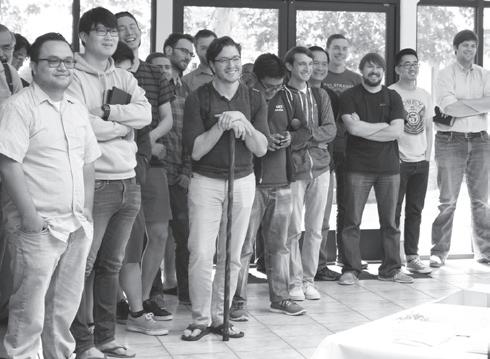


















































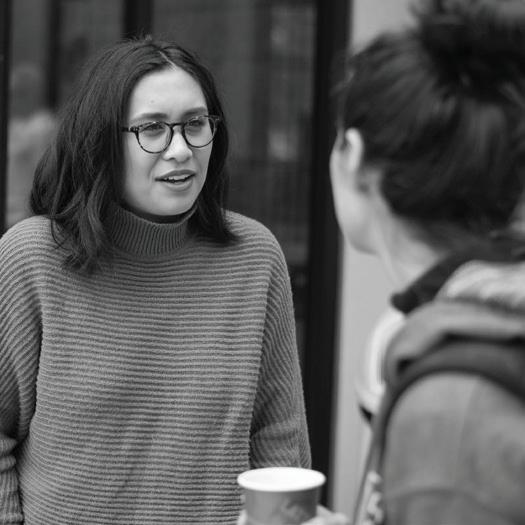



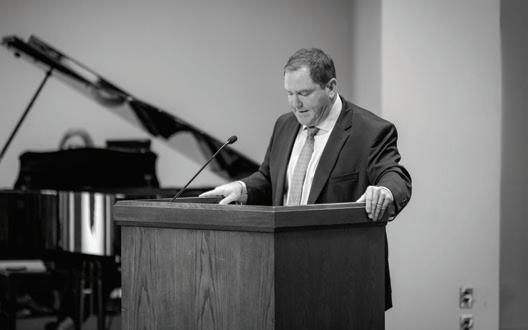
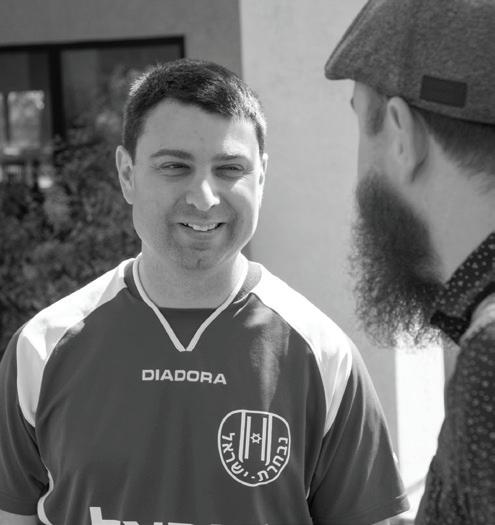
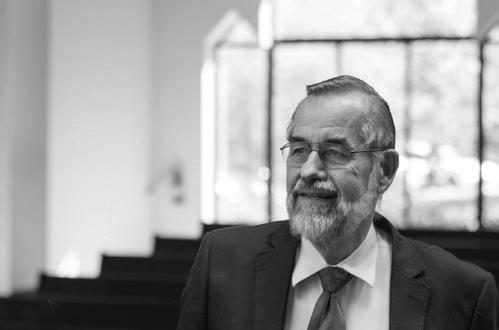
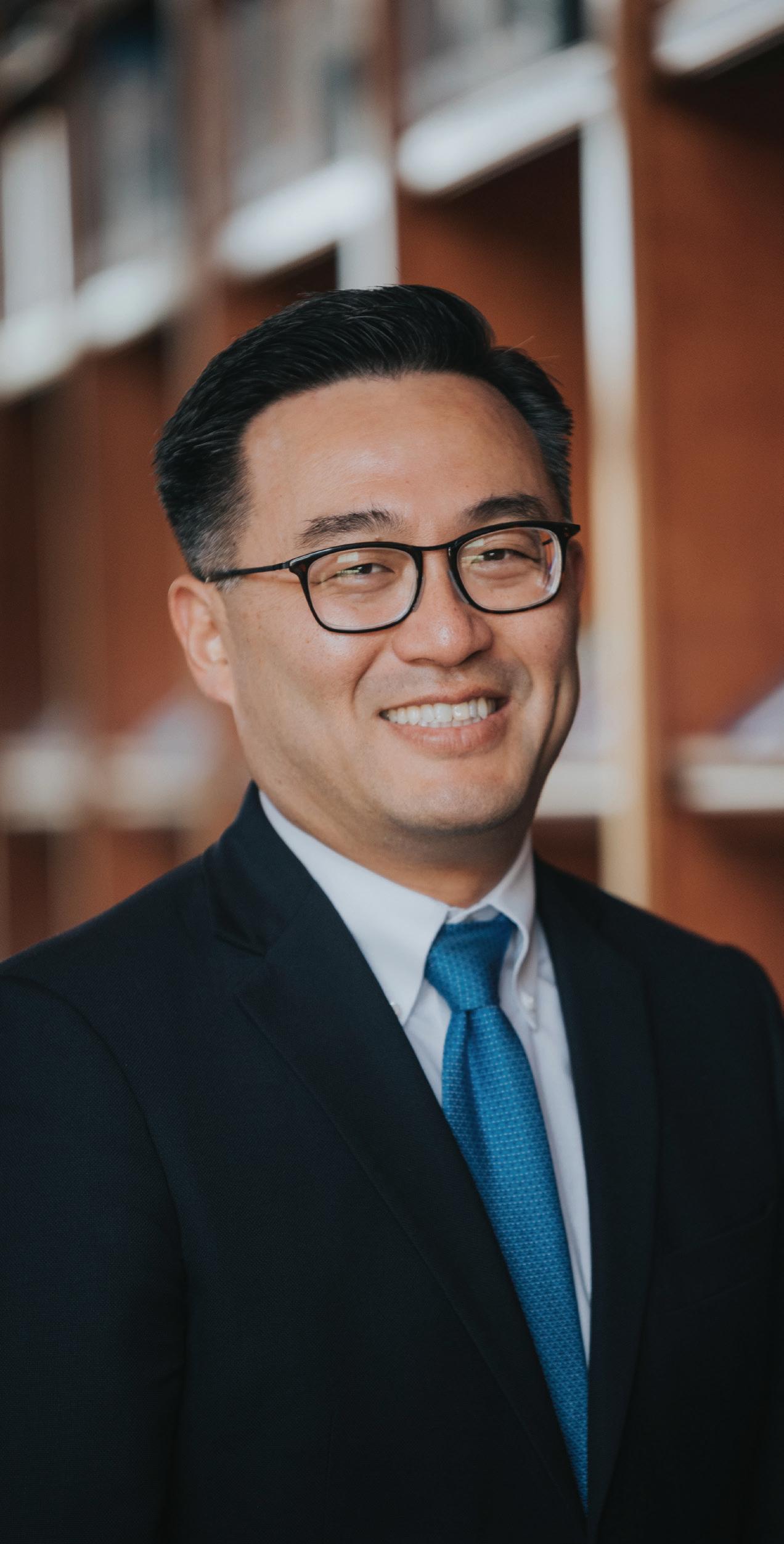
"This is how one should regard us, as servants of Christ and stewards of the mysteries of God. Moreover, it is required of stewards that they be found faithful."
Westminster Seminary California (WSC) exists for a marvelous purpose: to glorify Christ, teach his Gospel, and serve his Church. Jesus Christ presently reigns and rules from heaven, his Gospel is spreading to the ends of the earth, and his church is alive and well across the whole globe. WSC is committed to preparing faithful servants of Christ who will carry the grace and truth of God's word all over the world, to every square inch.
In this issue of UPDATE we consider our calling to serve Christ and his Church. In our faculty feature article, Professor Brad Bitner reflects on how in order to serve the church we must be a servant of the Word: Scripture is given to build Christ’s church. God’s Word is both the blueprint for this building project and the Spirit-empowered tool with which we build (p. 4). Current student Hannah Huyck shares about her personal experience from WSC vision trips (p. 8). These mission trips are preparing students to serve internationally. Professor David VanDrunen remembers Dr. Robert Strimple, who served faithfully not only as a professor of systematic theology, but also as our institution’s second president (p. 18).
It was a pleasure to see so many of you and your friends on our campus in January for our Annual Conference, “The Sufficiency of Scripture: Embracing God’s Word and Navigating Life.” Thank you to those of you who joined us (either in person or virtually) for this wonderful occasion. We trust you were encouraged by the lectures that clearly demonstrated the Holy Scriptures are the foundation of life and ministry, preparing us for a lifetime of service. The WSC community is united in our commitment to Christ’s truth as recorded in the Scriptures and expressed in the Reformed confessions of faith.
Thank you for your continued friendship and prayers as WSC strives to serve Christ’s church through the preparation of her servants, wherever the Lord calls them.
Cordially in Christ,

John Bales Vice-President of Development
UPDATE | SPRING 2025
PRESIDENT
Joel E. Kim
EDITOR
Jonathan Cruse
DESIGNER
Karly Steenholdt
PRINTER
Streeter Printing
UPDATE magazine is a publication of Westminster Seminary California.
For address changes, duplicate mailings, or additional magazine requests, please write or call.
Westminster Seminary California 1725 Bear Valley Parkway Escondido, CA 92027
PHONE (888) 480-8474
FAX (760) 480-0252
EMAIL development@wscal.edu
WEBSITE www.wscal.edu
PERMISSIONS: UPDATE grants permission for any original article to be photocopied and distributed, permitted that the wording is not altered in any way, no fee is charged beyond the cost of reproduction, and no more than 500 copies are made. Any exceptions to the above must be explicitly approved by Westminster Seminary California. Please include the following statement on any distributed copy: This article originally appeared in UPDATE, a publication of Westminster Seminary California (WSC), and is reprinted with permission. For more information about WSC, visit www.wscal. edu or call (888) 480-8474.
MISSION: The purpose of UPDATE is to showcase WSC’s distinctively Christcentered, graduate education through the work of its faculty, students and alumni who are serving as pastors, teachers, missionaries, and leaders worldwide in light of our overarching mission, “to glorify God through graduate theological study. . . for those who will serve in the Christian community and the larger society.”
Since 1979, WSC has offered a distinctly Reformed and rigorous education in order to glorify Christ, promote his gospel, and serve his church. The strength of our degree programs lies in our faculty’s unified commitment to the inerrant Scriptures and the Reformed confessions. WSC is the only dually accredited seminary in the Western United States serving confessionally Reformed churches.
2024-2025 BOARD OF TRUSTEES
Mr. Daniel J. Bryant
Rev. William Chang
Rev. CJ Den Dulk
Rev. Joel D. Fick
Rev. Dr. David W. Hall
Mr. Milton D. Hodges
Dr. Solomon Jo
Rev. Eric Landry
Mr. Mark Memmelaar
Rev. Steven D. Oeverman
Dr. James D. Paauw
Mr. Ronald W. Prins
Mr. Timothy W. Townsend
Rev. Dale A. Van Dyke
Dr. Thomas D. Vander Veen
Rev. Brian D. Vos
©2025 Westminster Seminary California
All rights reserved.
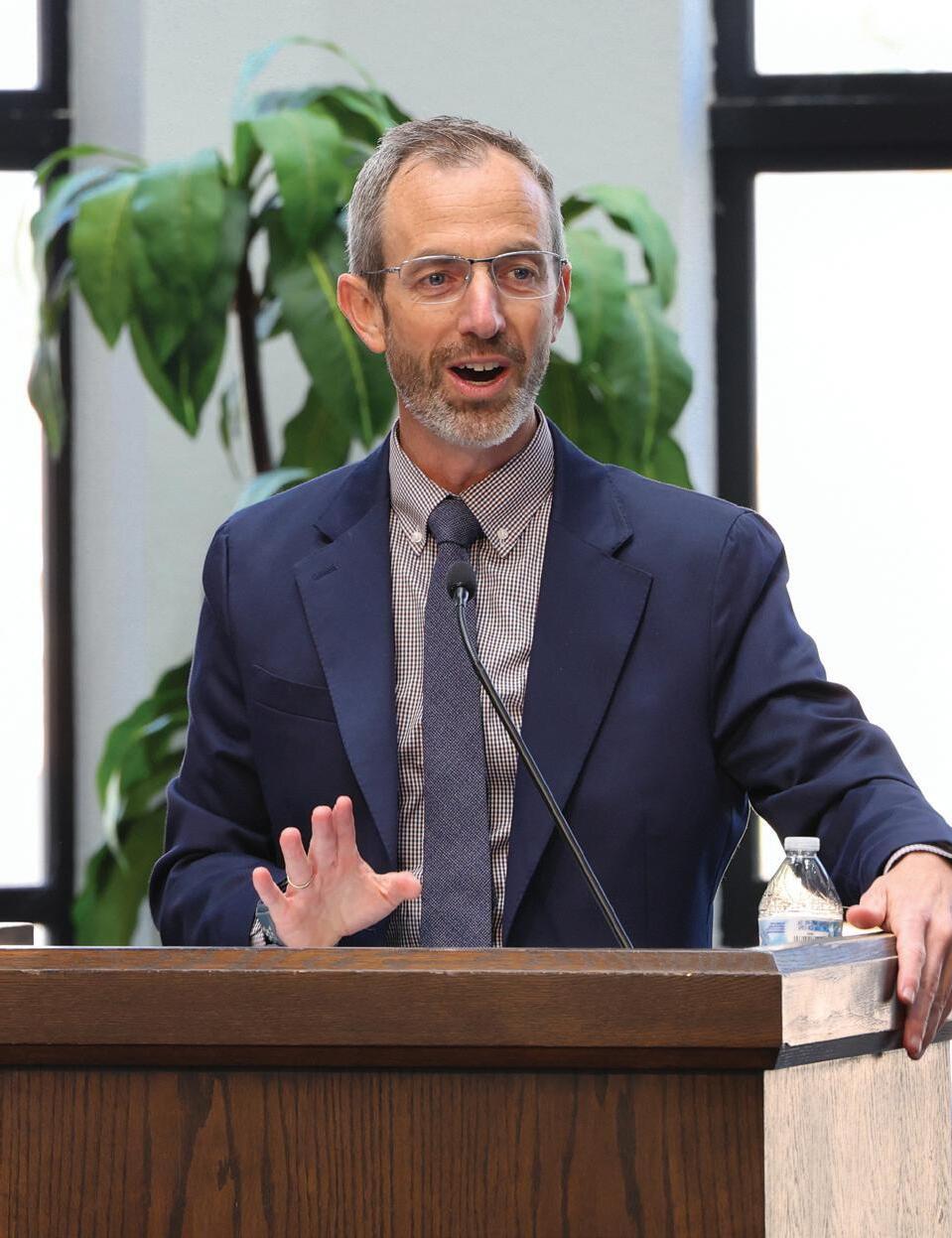

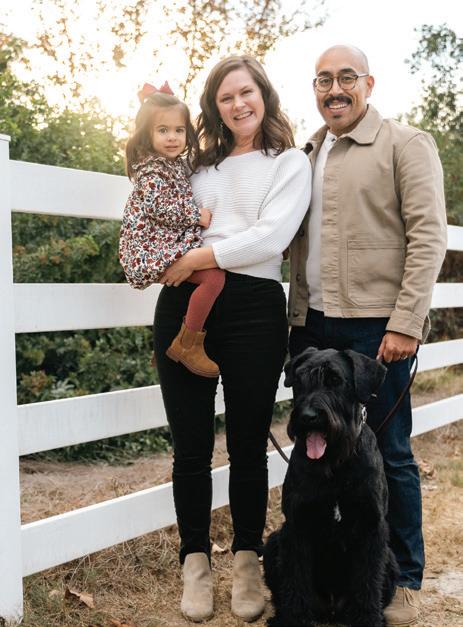
18 INFOCUS ONCAMPUS ONMISSION INPERSON & INPRINT 04 08 14
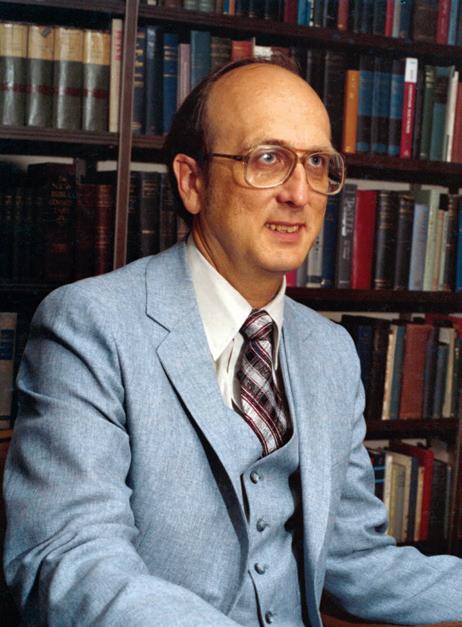
The Word That Builds by Bradley J. Bitner
The Cause Is Thine by Hannah Huyck
2024 Reformation Day Lecture + SFAD
WSC Welcomes Noah Collins
2025 den Dulk Lectures
Following Our Servant Savior's Lead by Chris Sandoval
Alumni News
Faculty Writing Honorarium + Memorial Gifts 04 08 10 11 12 14 16 18 21 22
In Memorium, Robert B. Strimple by David VanDrunen

by BRADLEY J. BITNER
God’s Word is a building word—it’s a word that builds, designs, and accomplishes things. This was true even before God’s Word was written down. Psalm 33 declares, “By the word of the LORD the heavens were made … for he spoke and it came to be; he commanded, and it stood firm” (vv. 6, 9). God’s Word is a powerful, creative Word that makes things happen. And in the Bible we have a Word that is just as powerful and perfect as that which spoke the world into existence. In fact, the Westminster Confession of Faith says that the written-downness of God’s Word in Holy Scripture is “most necessary.” Why? It is “most necessary” so that God might reveal Himself, His character, His works, His holy will “unto his church … for the more sure establishment and comfort of the church” (1.1). That is why, in His wisdom and goodness, God committed all things necessary for faith and life “unto writing.” This means that the way to best serve the church is by being a servant of the Word—because it is God’s Word that does the work for His people. It is God’s Word that builds up God’s church.
Scripture doesn’t only tell us information about God’s actions and words in history; the words of Scripture are redemptive revelation. Put another way, written revelation serves the purpose of redemption. Yes, God in his Word reveals his power and glory as one God—Father, Son, and Spirit. Yes, the Bible especially reveals the glory of Jesus Christ the Son of God as our Mediator. But all that revelation of the glory of God in Christ serves an even greater goal: the goal of building up God’s church in holiness and comfort unto His glory.
As Louis Berkhof puts it in his Systematic Theology: “The Bible is not only the principium cognoscendi of theology [the source of all our theological knowledge], but it is also the means which the Holy Spirit employs for the extension of the Church and for the edification and nourishment of the saints. It is pre-eminently the word of God’s grace, and
therefore also the most important means of grace.”1 In other words, Scripture is sufficient, yes—but sufficient for what? One of the key purposes that the Bible serves is edification. That’s a word we are used to hearing in Christian circles, but let’s not forget what it means: it means to build up. God’s Word comes to us in the form that it does—that is, a covenantal, canonical Word—for the express purpose of building up His church.
Though I never had the privilege of being in the classroom with Professor Meredith Kline, he was one of my formative teachers from a distance. I can remember where I was (on the C line of Boston public transit) when I first read his chapter in The Structure of Biblical Authority entitled “Canon and Covenant Community.”
Kline wrote that when we understand the covenantal character of Scripture, we see that “the Old and New Testaments have the specific purpose of serving as a building plan for the community structure of God’s covenant people … to define the covenant community as an authority structure or system of government by which the lordship of Yahweh-Christ is actualized among his servant people.”2 Kline is saying that the Bible—a covenantal canon—authoritatively structures, norms, and builds the covenantal community. It is an architectonic model, says Kline in his inimitable way. “The Scriptural word of God effectively wielded by the Spirit is the fiat of God’s new creation. It is through the instrumentality of Scripture as powerful word that God constructs his new redemptive temple-house, dynamically molding and incorporating his people as living stones into this holy structure. So employed by the Spirit, Scripture is architectural fiat.”3
“Architectonic model” and “architectural fiat.” I recall my heart being strangely warmed as I read those words. But what did Kline mean? Well, here’s an example: our very own newly-constructed Westminster Village! This blessing to our community was also a massive project that required at least two major things. First, it needed a blueprint, a detailed schematic so the builders could create according to the design. Second, there needed to be tools. Without
“The best way to serve the church is by being a servant of the Word—because it is God’s Word that does the work for His people. It is God’s Word that builds up God’s church.”
the heavy machinery and other instruments wielded by workers those buildings would never have become a reality. Blueprint is what Kline meant by “architectonic model.” He wrote further, “The New Testament is the triumphant Lord’s house-building word, his architectonic covenant for the new Israel. In terms of its edificatory purpose, covenantal canon may be thought of as the architectural model for God’s sanctuary-residence.”4 The new covenant word provides the design, the structure, the blueprint for God’s new covenant people.
Likewise, when Kline spoke of an “architectural fiat,” he was referring to a powerful tool that could accomplish the job. God’s Word doesn’t just give us the blueprint for the church. God’s Word actually calls the church into existence. God’s Word actually grows and builds up the church. As the Reformers insisted, the church is the creation of the Word, not the other way around. The church does not create or authorize the Scriptures. The church recognizes and receives the Scriptures because in fact the church receives its very life from the Word of God.
Yes, the Scriptures are given so that you and I can know the Lord and have eternal life. But the purpose is not only to save individuals. The purpose for which God gives us the redemptive revelation of the Scriptures is to gather and to organize and to grow a corporate people for himself, a church that he has designed to be a living temple, a people with whom he dwells by his Spirit, a people who are always growing, despite their sinfulness and weakness. By the Word, God’s church is growing up in the comfort of the Gospel and conformity to his holy will. They are a people being built up to display his glory and grace. That is what the Scriptures are sufficient for.
This theme unfolds from Genesis to Revelation. In the New Testament, we see how Jesus himself reactivates this theme in biblical theology when he says in Matthew 16:18, “I will build my church.” How will he do it? The answer given is by means of the Apostles’ gospel. Jesus builds his church when, after his resurrection, He ascends on high and through his Apostles his gospel is proclaimed and his word is written down. That is how Jesus makes good on his promise in Matthew 16:18 to build his church. The Apostles pick this up everywhere. For example, in Ephesians 2:20, what is the church according to Paul? It's a holy temple. What is it founded upon? The chief cornerstone is Christ. He says later on in Ephesians 4 that pastors and teachers are Christ’s beautiful gifts given for the specific purpose of building up the church (vv. 11–16).
Perhaps the pattern is most clear in Acts. In Acts 6:7, directly on the heels of the Apostles saying they need to devote themselves to prayer and the ministry of the Word, Luke tells us, “And the Word of God continued to increase, and the number of the disciples multiplied greatly in Jerusalem” (Acts 6:7). Luke is trying to say the church of God grew, but he says instead the word of God grew. Why? Because Luke is getting us to see that it is the proclaimed Word of Christ that grows the church. He does it again in Chapter 12, where, in contrast to Herod who is struck down after a vainglorious speech, “the word of God increased and multiplied” (v. 24). Likewise, in Acts 19, Paul is in Ephesus and there is a “competition” between the one true God and a so-called goddess, Artemis—one that ends when “the word of the Lord … prevailed mightily” (v. 20). The principle is clear: God’s Word written down for us and proclaimed
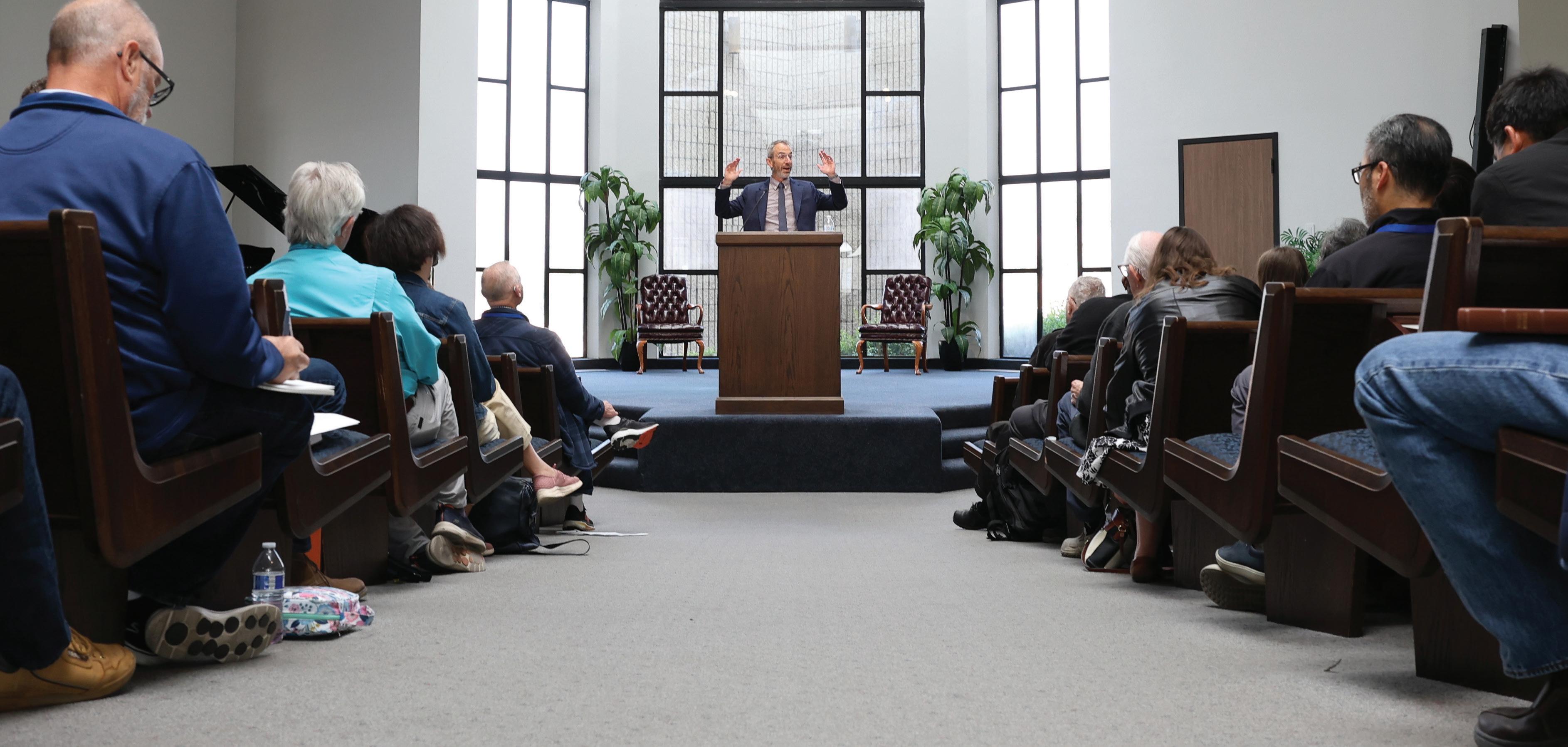
“ The principle is clear: God’s Word written down for us and proclaimed by us is the means by which the ascended Christ makes good on his promise to build his church.”
that we don't look to other things, ideas, or methods as we try to build up Christ's Church. We “build up” a company. We “build up” a brand. We “build” a consumer base. And it's all too easy for us to take from the world those ideas of building up by managerial prowess or by business strategy as we think about building up the church. But everything we need is here in God’s Word.
by us is the means by which the ascended Christ makes good on his promise to build his church.
In 1 Corinthians 3 there's an extended use of this theme. The context in Corinth is interesting in this regard: there is a building boom precisely as Paul is planting the church in that city—specifically, temples were being erected all over the city. But Paul says there’s actually one true Temple that the true God is building—and that’s you and me, the New Covenant community. There are so many rich truths to draw out from the text, but let me highlight a few.
First, Paul says that he is the architect, or the wise “master builder” (v. 11). He is the project manager. He makes sure that the work is completed according to design. In Corinth, this meant first laying a foundation with the gospel of Christ (v. 12)—and then secondly ensuring that all who come after build squarely upon it (vv. 11–13). Nobody can change that foundation, rather everyone who comes and builds after Paul must take heed to build squarely upon it! You can't build off center or the building is going to fall down. In essence, Paul says, “That’s the authoritative design for the building project of the church that I was given. It’s not mine; I was commissioned as a project manager. But now you must build upon it and according to the design.”
Paul gives sobering warnings about the penalties that come to those who build improperly (vv. 12–15). It’s a great motivation to look to the day of approval, when the project will be approved by the one who commissioned it. That day is the last day, when Christ will present His Bride, His Body, His Building, to his Father. Very encouragingly, Paul concludes this passage by claiming that everything we need for this work has been given to us (vv. 21–23). That is exactly how we should think about the sufficiency of Scripture: we have everything we need for the building of the church unto holiness for the glory of God.
If it is true that God has given us a perfect Word—a Word that is sufficient to build up Christ's Church—then what should our posture be as we come to it? We must be careful
Westminster Shorter Catechism 89 asks this question: “How is the word made effectual unto salvation?” The answer: “The Spirit of God maketh the reading but especially the preaching of the word an effectual means of convincing and converting sinners and of building them up in holiness and comfort.”
The Westminster divines knew their Bibles well! They knew this theme and they captured it here for us. If God’s Word is sufficient for building up God's church, then we need to be reading it. Moreover, we must place ourselves under the preached Word. The Catechism points out that it is “especially the preaching” of God’s Word that the ascended Christ uses to build up his church. 2 Timothy 3:15–16 reminds us that God’s Word is perfectly suited to everything. So then, pastors are encouraged (2 Tim 4:1–2) to preach the Word, day in and day out.
And even if you are not a preacher you still have a role to play here. The Shorter Catechism is again helpful in Question 90 when it asks, “How is the word to be read and heard that it may become effectual to salvation?” Answer: “That the word may become effectual to salvation, we must attend thereunto with diligence, preparation and prayer; receive it with faith and love, lay it up in our hearts, and practice it in our lives.” As we come to our own Bible reading, we must read prayerfully and meditatively. Do you pray during the week for your pastor as he prepares to preach? Do you order your Saturday evening such that you are ready to “attend diligently” to the Word is as it's proclaimed to you on the Lord's Day? If we really believe that God’s Word is effective for building us up—especially as it's preached to us—this is how we should come to worship. Paul’s words to the Ephesian elders are a wonderful exhortation to us as we embrace the word to grow in holiness and comfort: “I commend you to God and to the Word of his grace, which is able to build you up” (Acts 20:23).
1Louis Berkhoff, Systematic Theology (Louisville, KY: GLH Publishing), 521. 2Meredith G. Kline, The Structure of Biblical Authority (2nd ed; Eugene, OR: Wipf and Stock), 88.
3Ibid., 88–89.
4Ibid., 85.
Bradley J. Bitner is Associate Professor of New Testiment at Westminster Seminary California. Dr. Bitner and his wife, Kathi, have seven children.
by HANNAH HUYCK
She called me “sister.”
As the cool stone floor of the kitchen relieved my bare feet from Phnom Penh's swelter, I felt that word, so warmly given, embrace my heart in a way more enduring than any arms could. The home where we stood, Dahlia Dorm, has taken in over a dozen girls rescued from human trafficking and the young woman standing in front of me was one of their first. The power of the gospel to redeem and restore is movingly displayed in a story like hers. She has known evils we shudder to mention, yet laid them at the feet of her Savior. Many would reduce her identity to “victim,” but because of Christ, she is victorious.
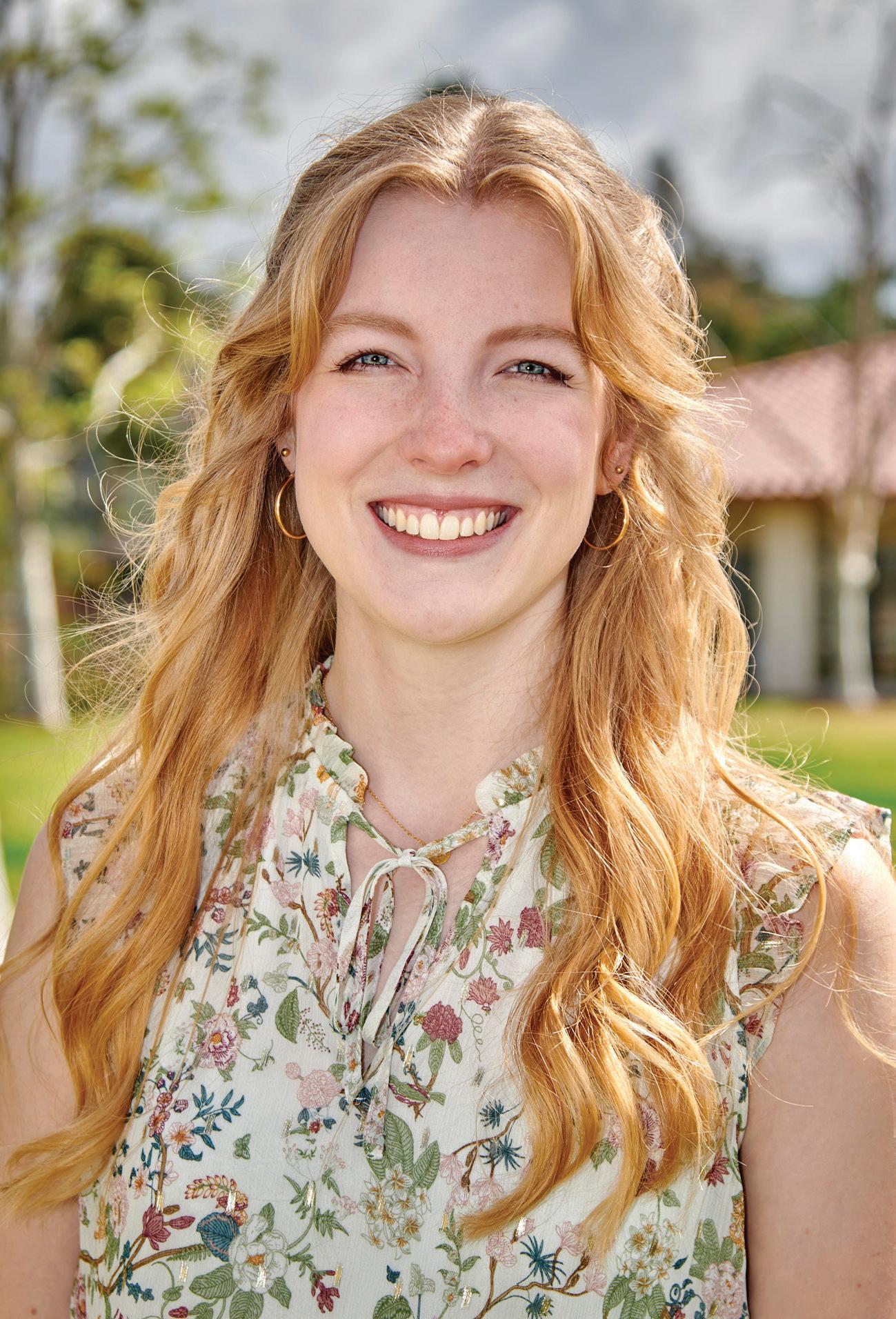
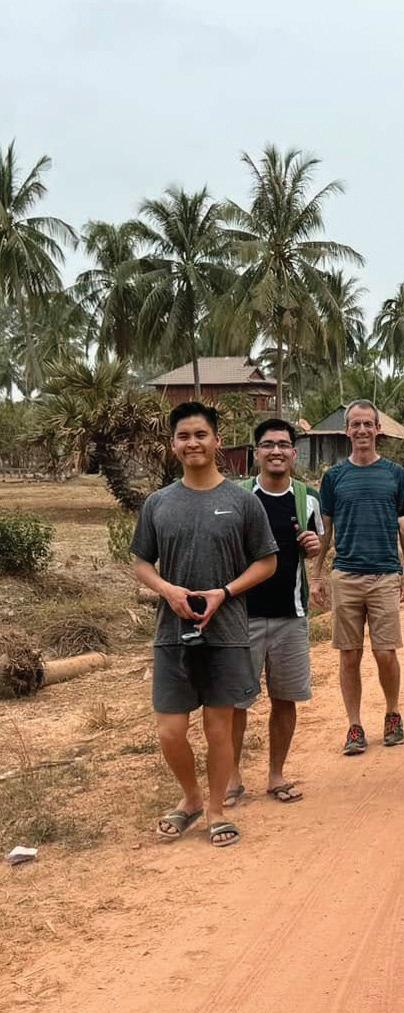

And there she was, referring to me, a stranger, in familial terms. Christians are accustomed to calling each other siblings, but on this occasion, I was struck with a sense of bafflement and awe. By any other standard, “sisterhood” doesn't fit. We differ in parentage, culture, continent, background, and lived experiences to no small degree. Yet, she was entirely accurate in describing us as sisters, for our Elder Brother in heaven has made us so.
The Westminster Confession of Faith has an entire chapter on the communion of saints, which teaches that for those united to Christ the Head, “being united to one another in love, they have communion in each other's gifts and graces” (26.1) and are further obliged to utilize such gifts to “encourage and build one another up” (1 Thes. 5:11). One way WSC has pursued this mutual edification is by sending students and professors on Vision Trips in partnership with Mission to the World (MTW), and I was privileged to be a part of the 2024 Cambodia team, where I met my new “sister.” A professor, four other students,
and I had the opportunity to glean wisdom from the MTW missionaries on the ground there, get to know some Khmer siblings in Christ, share some sermons and Bible lessons, learn up-close how the local church grows in a foreign context, and gain a better understanding of how we might support the global church.1 In short, we got to encourage and be encouraged.
My own motivation for going was rooted in a desire to clarify whether foreign missions is perhaps where the Lord is calling me post-graduation. Indeed, he graciously used the experiences I had in Cambodia to both prompt me to pursue this path and continue to greatly encourage me along the way.
“Sweaty and sanctifying” was the description I frequently gave to folks afterward inquiring about the trip. Don't get me wrong: although it was packed as tightly as our suitcases with sweetness and joy and laughter, I was also confronted with my own weaknesses and inadequacies. Yet a message continually broke through: “My grace is sufficient for you, for my power is made perfect in weakness” (2 Cor. 12:9a). Missionaries are not superheroes; they're ordinary servants of God who seek to be obedient to his commission. I treasure the conversations I had with several members of the Cambodia team, particularly regarding challenges in missions. Their words attest that we don’t
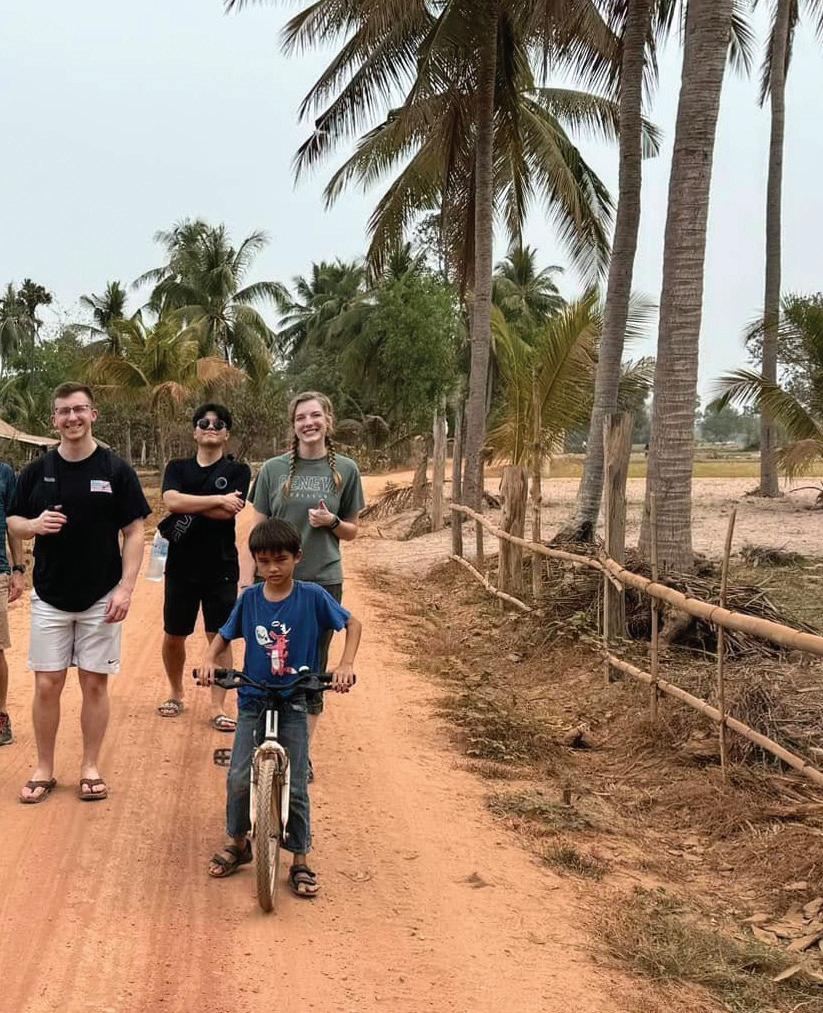
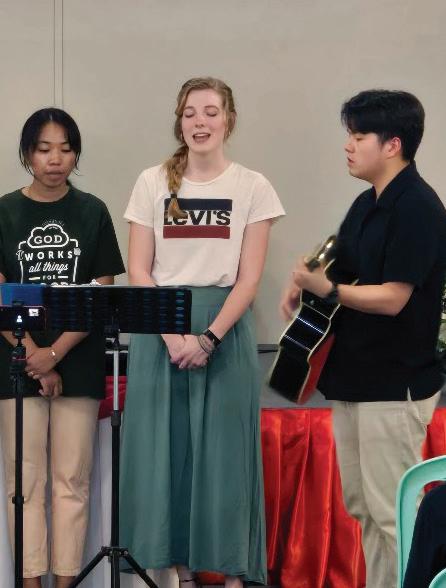

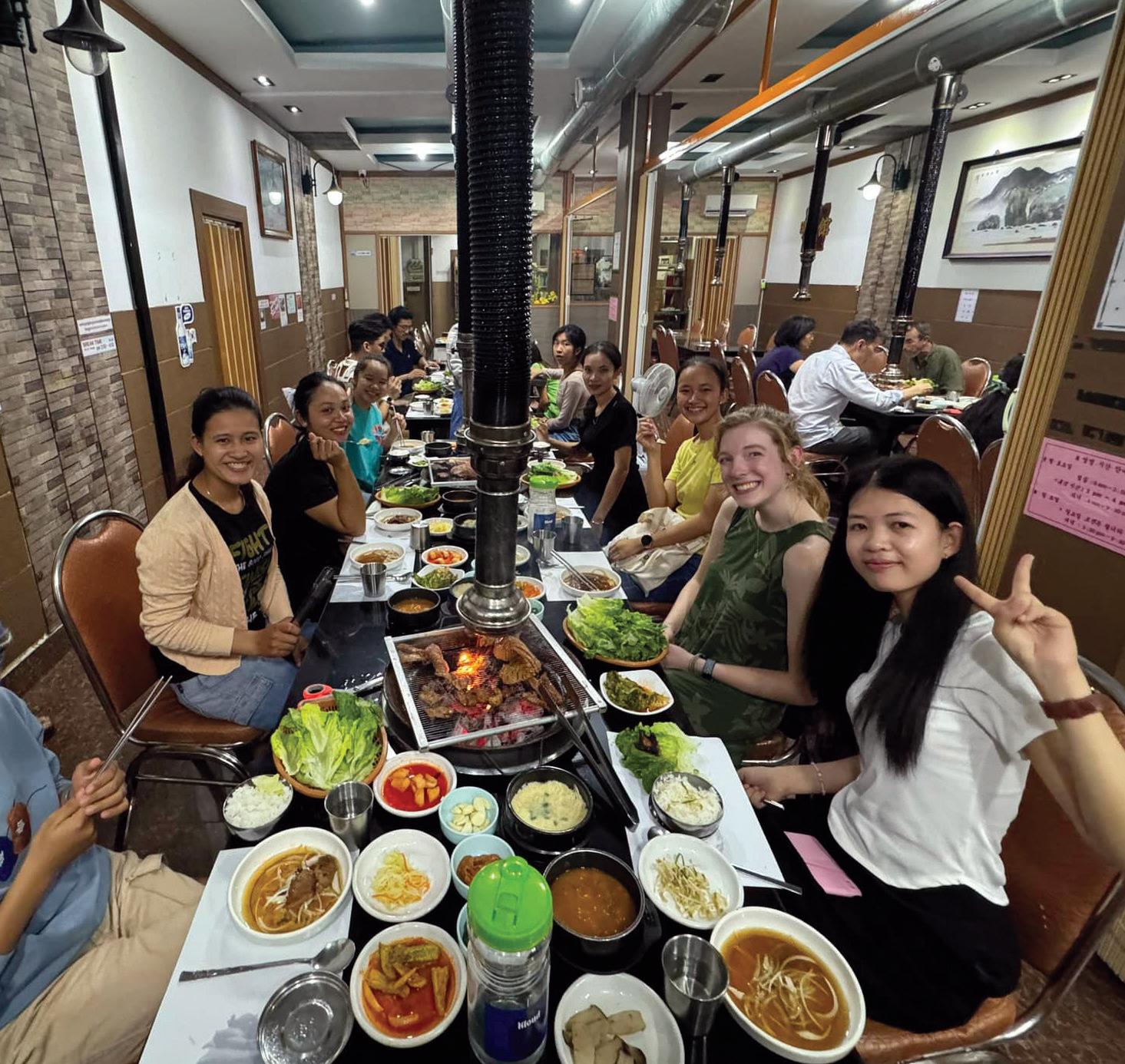
have to be dazzlingly talented, daringly adventurous, perfectly knowledgeable, or even socially extroverted to play a role in spreading the Word abroad. The Holy Spirit is faithful both despite and through our weaknesses—we just have to go as the Lord calls.
As family in Christ, we are responsible to serve each other according to our gifts, and this ordinance transcends national boundaries. WSC's Global Church Initiative equips students for biblically-sound ministry and aims to bring encouragement to those laboring abroad. The MTW Cambodia team partners with Khmer believers to cultivate the local church and seek the well-being of the larger community. The young woman whose life was radically changed by the ministry of Dahlia Dorm is now its social worker, caring for both the physical and spiritual needs of the girls who come under her wings.
“Missionaries are not superheroes; they're ordinary servants of God who seek to be obedient to his commission.”
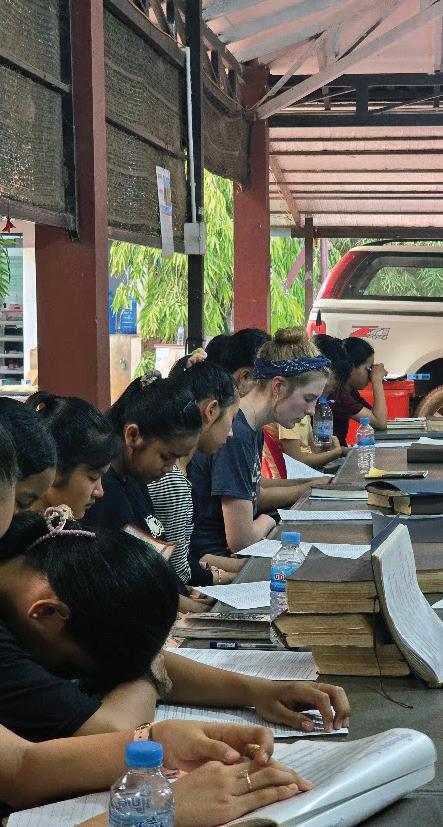
Through time spent with these brothers and sisters, my own heart for the global church has expanded and I am set for an internship with the MTW Bulgaria team focused on anti-trafficking ministry late this year. We may not know how exactly God will use us with our particular talents and infirmities, but as The Valley of Vision prayerfully recounts of the Lord, “thou canst accomplish great things; the cause is thine, and it is to thy glory that men should be saved.”1 May we all go forth in the confidence of this truth.
Hannah Huyck is an MATS student at WSC graduating in May ‘25. She is originally from Middle Georgia and headed next for a missions internship in Bulgaria in November 2025.
1 “God’s Cause,” in The Valley of Vision, edited by Arthur Bennett (Edinburgh: Banner of Truth, 2009), 175.
Each January, Westminster Seminary California features a number of special elective courses as part of the Winter term class offerings. One of these courses is selected as our Alumni Winter Refresher and is intentionally scheduled during the week leading up to the Annual Conference in order to help non-local alumni make the most of a trip back to Southern California. Those who are able to join for these exciting events often remark that the week feels like a family reunion with beloved brothers and sisters in Christ, complete with the rich teaching and warm fellowship that continue to characterize the WSC educational experience.
For the 2025 Alumni Winter Refresher, we were delighted to have 47 alumni auditors register for Dr. David VanDrunen’s course The Christian Virtues in Reformed Moral Theology, 11 of which registered for in-person attendance and 6 of which opted for hybrid (virtual and in-person) participation. For those who attended

either the Winter Refresher or the Annual Conference in person, the seminary hosted a new event that promises to become another staple feature of this special week: an Alumni & Friends Gathering at an Escondido favorite, Stone Restaurant. President Joel Kim and Dr. Jason Barrie enjoyed a casual time of connection and rich fellowship with a small group of alumni who are serving the church locally, around the United States, and abroad.
The occasion afforded graduates from various decades of WSC’s nearly 50-year history the opportunity to reflect on memories of their seminary years in addition to sharing the common burdens of ministry across denominational and geographical situations. Reflecting on the evening, Dr. Barrie noted, “I personally experienced the fatherly joy of a gray-haired professor hearing former students affirm the importance of the training [they] received and express deep gratitude for the whole WSC team.” This event is just one of several alumni gatherings that WSC staff and faculty have recently hosted in various locations across the United States, including a gathering in Grand Rapids, MI and a dinner in Orlando, FL. Through these casual times of fellowship, the seminary hopes to nurture ongoing relationships with and between graduates, while also drawing mutual encouragement from stories that highlight the compounding value of a WSC education in the lives and ministries of our esteemed alumni.
On October 25th, in conjunction with our Fall Seminary for a Day, the campus was delighted to host a special Reformation Day lecture by Dr. Horton, titled “Let God Be God!”
Martin Luther nailed his famous 95 Theses to the church door in Wittenberg. But what was Luther trying to accomplish? Luther was not after igniting a reformation, he simply wanted answers: he wanted to know who God really is. He believed the church was clouding the answer, not clarifying it. He thought the penitential system made salvation too easy and thus gave a wrong impression of God—He was the exacting Judge, after all! This God—the real God, as Luther would say—first brought Luther to deep despair, but then it drove him to Christ in the gospel. As Horton reminded us, “Out of his search for the true God who judges the ungodly, Luther discovered also the gracious God who justifies them.”
The chapel was packed, and many joined online to celebrate the good work of God in the Reformation!
Westminster Seminary California was pleased to recently welcome Mr. Noah Collins to serve as our Director of Admissions and Alumni Relations. Before joining WSC, Noah enjoyed a diverse career in the golf industry, in several different capacities in the energy sector, developing multi-measure projects to help large institutions achieve their sustainability goals, and most recently as VP of sales, marketing, and service for an aircraft manufacturer. Noah has a heart to serve the church through new student recruitment at Westminster Seminary California and looks forward to building strong relationships with prospective students and their families. He resides in San Diego where he is an avid cyclist and serves as an elder and chairman of the consistory and council at Christ United Reformed Church (URCNA) in Santee, CA.
We asked Noah a few questions to help you get acquainted with him.
WHERE ARE YOU FROM, AND WHAT IS YOUR ACADEMIC BACKGROUND?
I grew up in a small town in the Hudson Valley of upstate NY. After high school, I accepted an appointment to the United States Naval Academy in Annapolis, MD, where I majored in Ocean Engineering and received a flight billet upon graduation. I was trained as a carrier aviator and served aboard the USS Carl Vinson and the USS John C. Stennis post - 9/11.
HOW DID YOU COME TO FAITH IN CHRIST?
My journey to Christ was initially an academic exercise while I was in college and the Navy. I spent a lot of time reading and discussing the big questions with friends and family. All the while the Lord was working in my heart, but it wasn't until I got out of the Navy and reconnected with an old college friend while living in Florida that I began to take the means of grace seriously and came to a reformed understanding of the faith. My friend was attending Saint Andrew's Chapel in Sanford, Florida, so I was very fortunate to have been exposed to the preaching and teaching of R. C. Sproul.
WHAT WERE YOU DOING PRIOR TO JOINING THE TEAM AT WSC?
Prior to joining WSC, I was the Vice President of Global Sales, Marketing, and Service for ICON Aircraft (maker of the ICON A5 amphibious aircraft) and living in San Diego, CA.
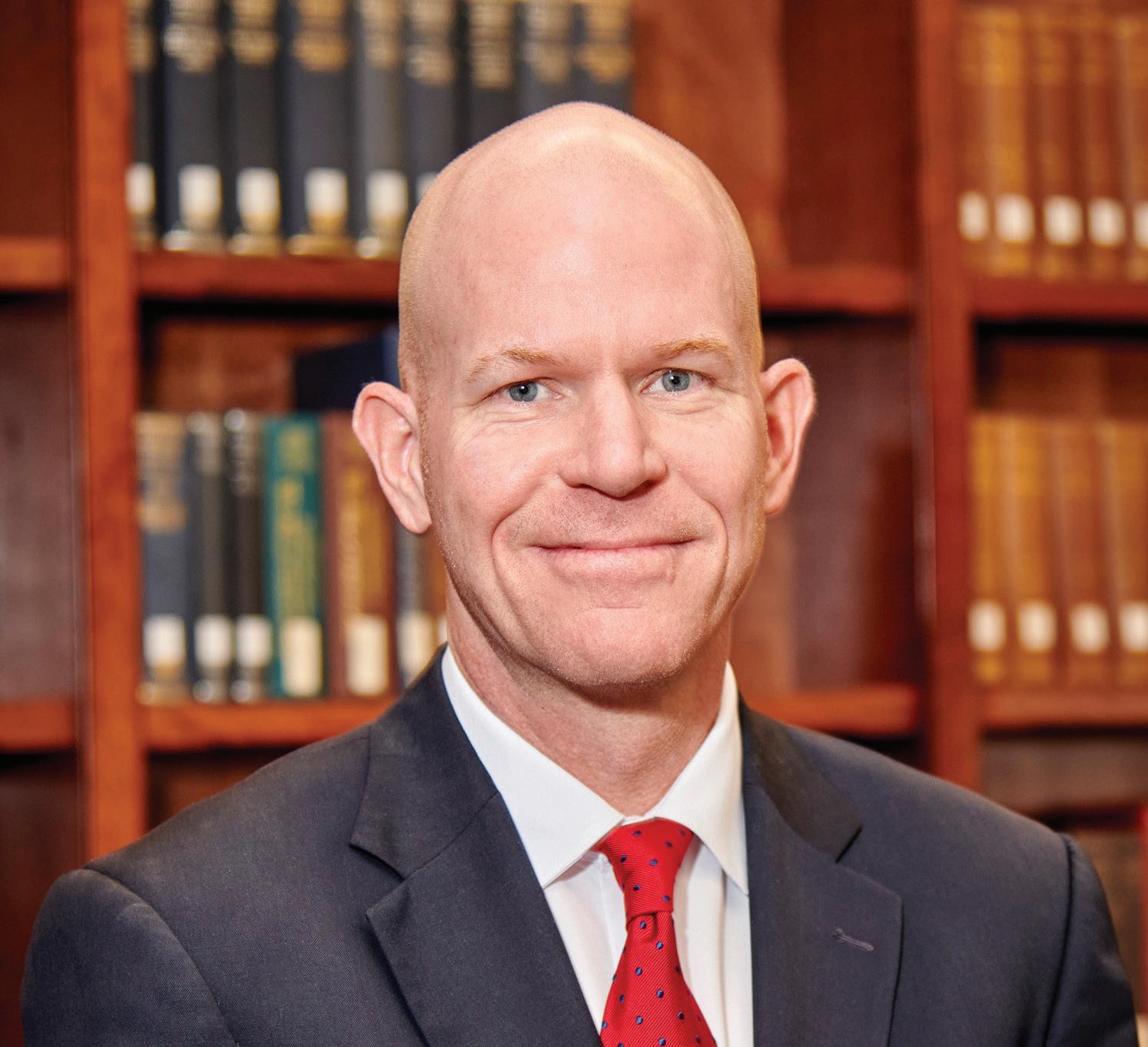
HOW DID YOU COME TO BE INVOLVED WITH WSC?
I have been a member of Christ United Reformed Church (URCNA) in Santee, CA for over 15 years and currently serve as an elder there, so I have known about WSC for a long time, and I have personally benefited from the seminary in a myriad of ways. I have a heart for the mission of the seminary and wanted to get involved more directly.
WHY DO YOU THINK A WSC EDUCATION / EXPERIENCE MATTERS?
I think a WSC education matters because of the great depth of community found here. I think WSC uniquely prepares folks for church ministry that is extremely hands on and very personal while grounded in the rigorous study of God's Word for the sake of Christ and his church.
WHAT ARE YOUR HOPES FOR ADMISSIONS AND ALUMNI DURING YOUR TENURE?
I hope to build strong relationships with prospective students, alumni, and their families. I also hope to make WSC the Reformed seminary of choice especially on the west coast through various targeted outreach programs to include working with alumni, college ministry programs, churches, and the chaplain corps to name a few.
WHAT ARE SOME OF YOUR HOBBIES?
I am an avid cyclist and golfer.
WHAT BOOKS ARE ON YOUR NIGHTSTAND?
Metamorphoses of the City by Pierre Manent, Wonder Confronts Certainty by Gary Saul Morson, and Augustine of Hippo: A Biography by Peter Brown
We are pleased to welcome Noah to the WSC team. Please join us in praying for him and our team as we seek to welcome new students and care for our graduates.


Do you see everyone around you as someone with an eternal soul, or are they merely background noise in the hustle and bustle of life? Do you see people as Jesus sees them? These are some of the questions explored by Rev. Eric Hausler, church planter, pastor, and evangelist, during Westminster Seminary California’s 2025 Robert G. and Nellie B. den Dulk Lectures on Pastoral Ministry.
The den Dulk lectures are intended to shape the shepherding and growth of future ministers and servants of Christ through engagement with a seasoned pastor in Christ’s church. This year, WSC was delighted to welcome Rev. Eric Hausler (WSC alum, 1989). Rev. Hausler’s series, titled “O Lord, Open My Eyes: From Escondido to the Edge of the Everglades” unpacked his forty years of life and learnings as a pastor spanning from his education at WSC to his current position as church planter of Christ the King Church (Orthodox Presbyterian Church) in Naples, Florida. Sharing his passion, experience, and wisdom was a blessing to our community. He gave two lectures addressing his perspective on church planting and ministry, evaluating the past and looking forward to the future.
In the first lecture, “The Needed Eyesight of a Church Planting Pastor,” Rev. Hausler explored 2 Corinthians 5. He focused particularly on verse 16, “From now on, therefore, we regard no one according to the flesh. Even though we once regarded Christ according to the flesh, we regard him thus no longer.” We were encouraged to develop “evangelistic eyesight,” to see everyone as someone made in the image of God with an eternal soul. In other words, to see them as Jesus sees them.
“The love of Christ compels us to have eyes full of love and compassion for everyone we meet.”
Rev. Hausler warned that it is easy to overlook, pass by, or disregard those God has placed in our spheres of contact and influence, essentially viewing them as "Landscape People." He challenged us by asking, “Is this true of us? Do we no longer regard people according to the flesh and judge according to the world’s standards? Do we determine the worth of others by their gifts, talents, beauty, education, standing... or do we see them as someone who possesses a soul that will never die—a soul that needs the grace of God as much as we do?”
As those who have been loved and renewed by the grace of God in Christ through the Spirit, our focus should be on seeing those around us as possessing value and dignity. Furthermore, they need to hear the good news of the gospel. As 2 Corinthians 5:14–15 reads, “For the love of Christ controls us, because we have concluded this; that one has died for all, therefore all have died; and he died for all, that those who live might no longer live for themselves, but for him who for their sake died and was raised.”
The love of Christ compels us to have eyes full of love and compassion for everyone we meet. We don’t regard them as the flesh, the world, and our culture do, but as our Savior regards them. Everything changes in our view of others when we encounter the mercy of Jesus. After meeting the one who never sinned, who died for us, who rose for us, who is living and reigning for us, who sent his Spirit to regenerate and renew us, who loves us, how can we do anything other than view those around us with the eyes of love?
Rev. Hausler provided numerous examples comparing and contrasting the eyes through which Jesus saw people and those of others around him. Some examples include the woman at the well in Samaria, Zachaeus, the man born blind, the rich young ruler, etc. He concluded the first lecture praying, “O Lord, give us your eyes, forgive us for our blindness, and change our hearts and minds. Give us the love of Christ for a lost and dying world.”
Rev. Hausler’s second address explored the lessons gleaned through four decades of experience. His lecture
titled, “The Rearview Mirror of a Church Planting Pastor,” considered the words of Paul in Philippians 4:9, “What you have learned and received and heard and seen in me – practice these things, and the God of peace will be with you.” The lecture included two Top Ten lists: The Do’s and Don’ts of Church Planting. In addition, Rev. Hausler shared 15 Biblical Principles needed for effective outreach and pastoral/ practical/purposeful counsel regarding “next steps.” Rev. Hausler's handout with additional notes, examples, and biblical references is available on our website at wscal.edu/ churchplantingpastor.
One of Rev. Hausler’s most prominent insights for those engaged in outreach was to rehearse and apply his first-day lecture. For example, he encouraged us to avoid doing outreach from a sense of duty alone. Certainly, there is a sense of duty and calling to outreach, but it is the love of Christ and love for others that controls and compels us. He noted that people can “... smell duty... if you are not interested in them, if you are just doing it for a notch on your belt, people can sense that. Show people you love them and are interested in them. Pray for a love for the lost... do evangelism because God has shown mercy to you.”
In addition to the lectures, Rev. Hausler and his wife of 37 years, Donna, engaged our students and Seminary for a Day guests during a Q&A Session and dessert reception. The lectures are available on the WSC YouTube channel and through our website.
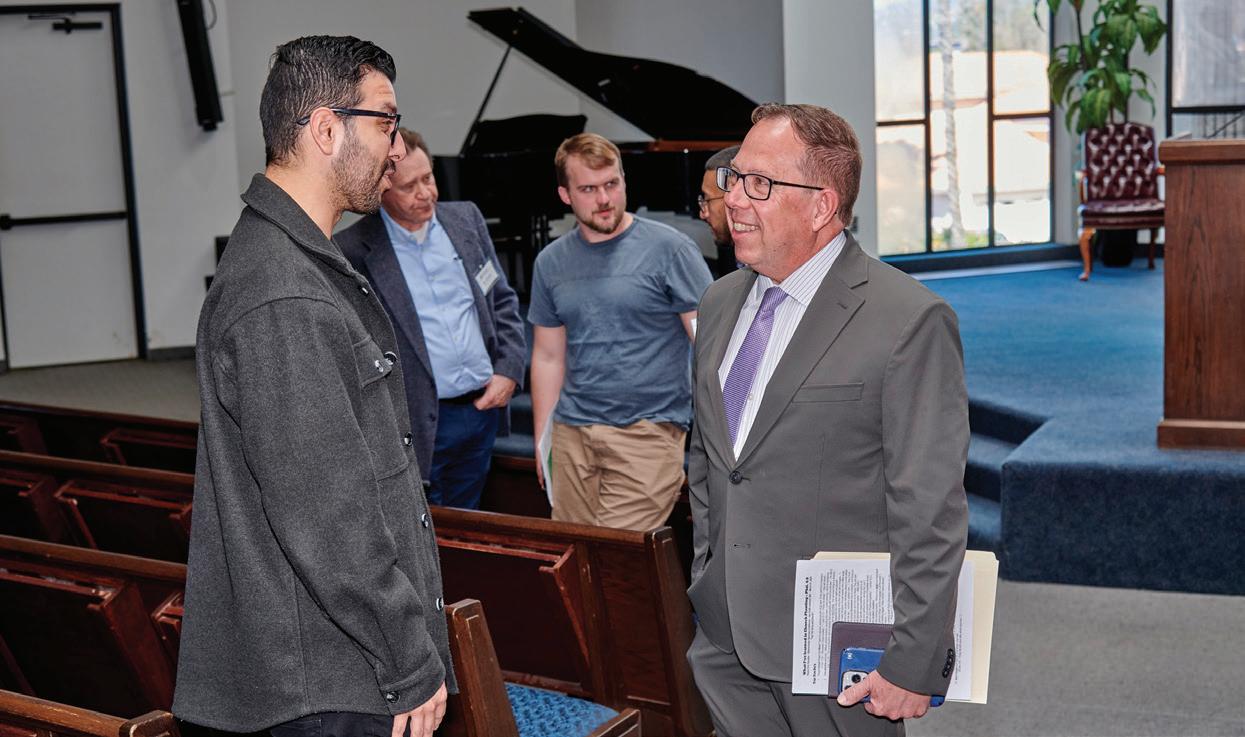
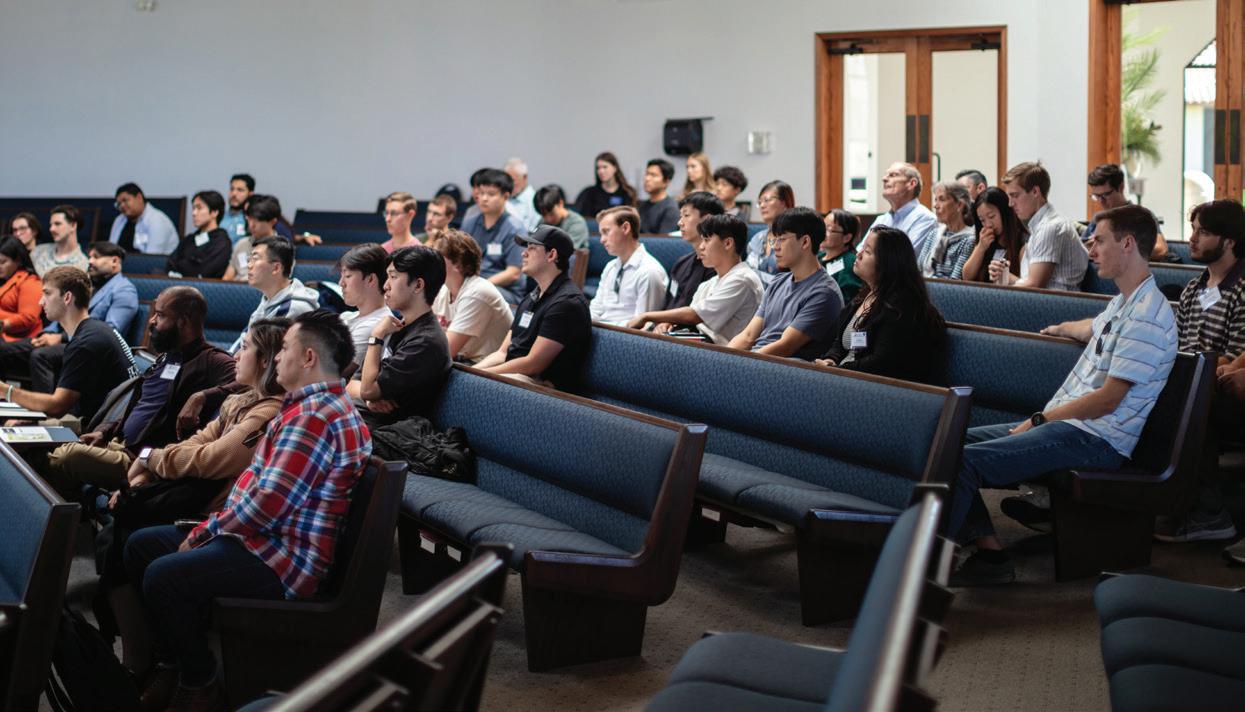
by CHRIS A. SANDOVAL
They were on their way to the capital city, and for the third time Jesus warned his disciples of his impending death and resurrection. But all they heard him say was, “we’re going to Jerusalem” (Mark 10:32–34).
Convinced that Jesus was about to overthrow the evil Roman empire and make Israel great again, James and John made their move and beat the others to the punch. “Do whatever we ask of you,” the Sons of Thunder audaciously demanded of Jesus, “give us positions of power, privilege, and praise when you become king” (Mark 10:35–37). But
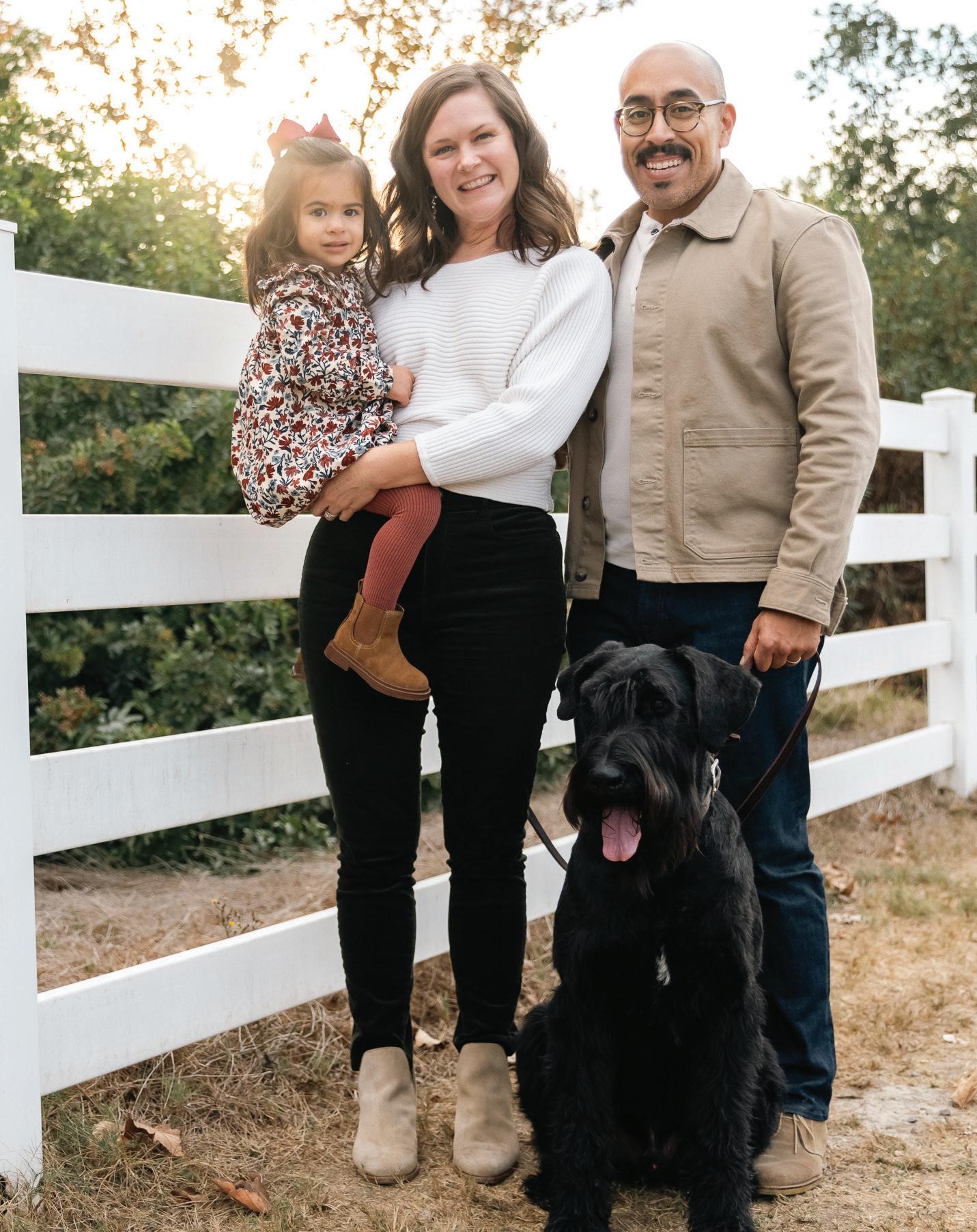
James and John—and the other disciples—had fundamentally misunderstood Jesus’s mission and their role in it. So Jesus corrected them again and turned their ideas of greatness upside down.
He reminded them that in this hateful and hurtful world, being great means being first and high above others by controlling them and demanding their respect (Mark 10:42). But in his loving and grace-filled kingdom, said Jesus, being great means being last and low by willingly serving others and lifting them up (Mark 10:43–44). Why? Because that’s how our King first demonstrated his greatness, by serving and saving us. “For even the Son of Man came not to be served,” declared Jesus, “but to serve, and to give his life as a ransom for many” (Mark 10:45).
This is perhaps one of the most radical things Jesus ever said, and it is also the Gospel.
Named for our Savior, Servant Church of San Diego launched in 2016 after I sensed God’s calling to share the gospel and grace of Jesus with the inner-city community of Logan Heights. Located just southeast of downtown San Diego and partially beneath the Coronado Bridge, this culturally rich and historically diverse community still struggles with economic poverty and criminal exploitation. Despite the many challenges of ministering in this context, however, Servant Church is committed to loving and serving our often overlooked and underserved neighbors—as Jesus first loved and served us.
Like most inner-city communities, Logan Heights has long been the place where San Diego has kept its unwanted. Beginning with Spanish colonization and continuing through American expansionism, successive waves of people—such as Kumeyaay Indians, Mexicans, Asians, and Blacks—made our community their home because they were prevented from living or organizing elsewhere in the city. More recently, Logan Heights is also having to shelter growing populations of homeless persons and refugees. Believing that all Christians are former strangers and aliens now freely welcomed into God’s household (Ephesians 2:19), Servant Church desires to be a spiritual home for our city’s unwanted.
Located just 15 miles north of the US-Mexico border, Logan Heights is also a border town community. And although Servant Church is a US church plant, our context is culturally, demographically, and statistically foreign to many American Christians. For example, our community’s population of 40,000 is over 85% Hispanic, which means our
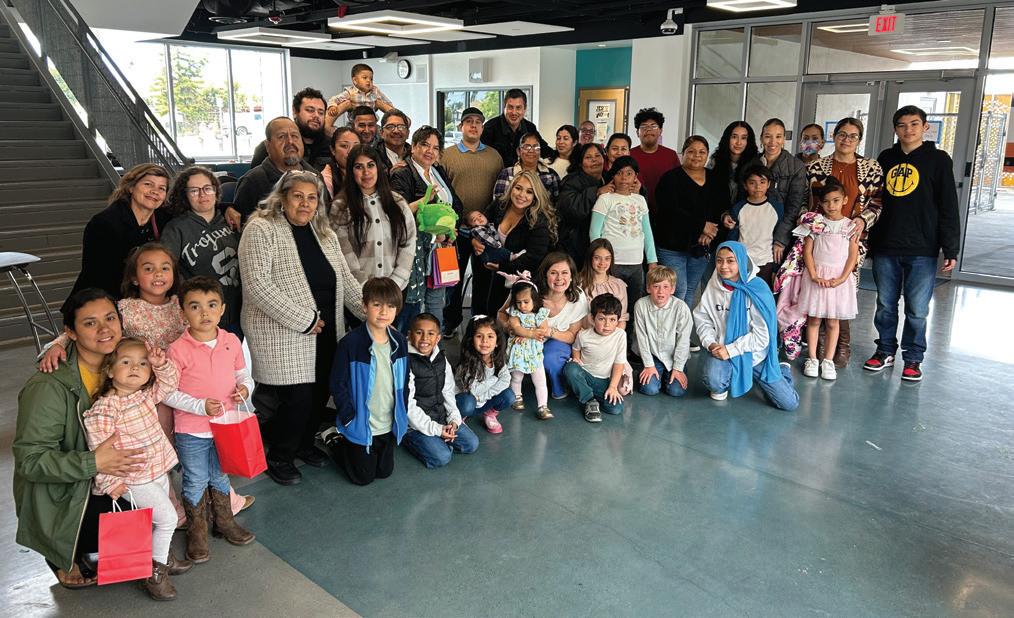
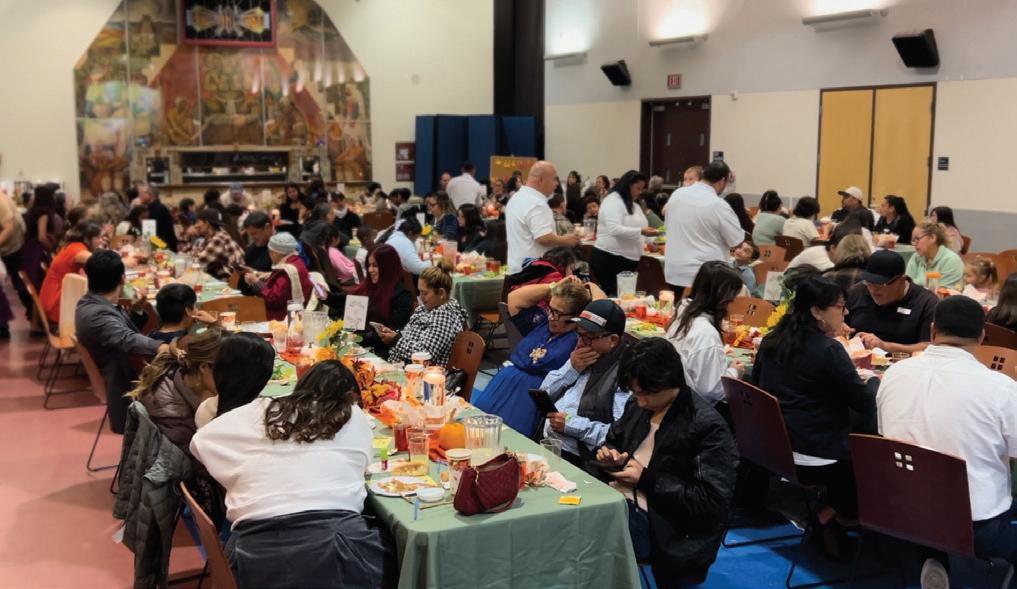
worship services, Bible studies, and evangelistic outreaches are fully bilingual in order to connect with our neighbors and their multi-generational families. Additionally, Hispanics’ spiritual openness means they are often susceptible to false gospels, Christian cults, and even overt paganism— all of which are active in our community. Lastly, Logan Heights also has the city’s highest number of children per capita—roughly 1 out of every 3 of our neighbors is under the age of 18. And among our community’s children, 30% are considered homeless, 60% will not graduate from high school, and 80% live at or below the poverty line. It is within this context that Servant Church obeys Jesus’s command to make disciples of all nations (Matthew 28:19–20).
Finally, because Logan Heights continues to suffer from systemic governmental failures, ever-changing immigration policies, and generational cycles of brokenness, Servant Church strives to be an “every day” church—one that is in our community, for our community, and serving our community every day of the week. In addition to worship, discipleship, and evangelism, over the years we’ve also launched two other ministries. In 2017, we started Alma Community Care, a separate faith-based non-profit that
provides professional mental health help with gospelcentered care to our community's families. And in 2018, we began Strong Youth Outreach, a program focused on helping our community’s unchurched and at-risk teenagers become spiritually and relationally strong in the Lord. As a congregation following Jesus’s lead and laboring in God’s harvest field, Servant Church works hard to teach and preach the gospel in our community while bringing healing, help, and hope to our neighbors (Matthew 9:35-38).
After almost 20 years of ordained ministry, I continue to thank God for my time at Westminster Seminary. Studying God’s word, working through theology, learning from church history, and training in preaching all taught me that the ultimate goal of ministry is to make the Gospel of Jesus accessible and applicable to all—especially the least, last, and lost among us.
In your prayers for Servant Church, please pray: 1) that God would bless all of our efforts to share Jesus with our neighbors, 2) that God would protect our community’s children from evil, and 3) that God would raise up local leaders and laborers to serve our inner city families in Jesus’s name. Thank you!
“Servant Church strives to be an ‘every day’ church—one that is in our community, for our community, and serving our community every day of the week.”
The son of Hispanic immigrants and an MIT graduate, Chris received an MDiv from Westminster Seminary California in 2005, was ordained to ministry in 2006, and was called to plant Servant Church of San Diego in 2015. His wife, Carrie Anne, is the Executive Director of Alma Community Care. Together they live, work, and serve in Logan Heights with their daughter, Magnolia Mae. Servant Church is a mission work of the Presbyterian Church in America (PCA).
If you have an update to share, we'd love to know! Email us at alumni@wscal. edu and be sure to include your name, graduation year, and degree received.
1983
Suk Ho Moon (MAR-MDiv) recently completed a commentary on the book of Acts and is teaching Practical Theology at Globe Covenant Seminary in Georgia.
1987
Jeff Stull (MAR) is now honorably retired from the Metro Atlanta Presbytery of the PCA and his counseling ministry. He continues to lead a men’s sexual recovery support group with the Samson Society called A Sacred Gathering of Men in Sautee Nacoochee, GA and also enjoys teaching The New City Catechism for the 4th & 5th Grade Sunday School class at Christ Presbyterian Church, Clarkesville.
1990
Wally Hostetter (DMin) recently began Nvisioned, a ministry of refinement for preachers and speakers. After 48 years of ministry, he is excited to provide coaching for those who are beginning, or continuing, the ministry of the Word.
1992
Richard Stern (MDiv) began serving part-time as pastor of Reformierte Kirchgemeinde Wangen an der Aare on March 1, 2025 after returning from pension.
2000
Dr. Daniel Hyde (MDiv) gave a paper at the Far West Region of the Evangelical Theological Society on April 4 entitled: “‘To Prepare Ourselves for the World to Come’: Eschatology as the End of the End of Living Well to God in William Ames (1576–1633).”
John Carter (MDiv) has been serving as Assistant Professor of Pastoral Theology at Trinity Evangelical Divinity School since 2022 and recently received a Visiting Scholarship at the University of Edinburgh for the
2025-26 academic year to research the Church of Scotland's 19th-century mission to India.
2002
Brandon Edmonds (MDiv) began serving as the Senior Pastor of Sierra View Presbyterian Church in Fresno, CA in August of 2023. He and his wife, Anna, have two children: Eliza and Arthur.
Patrick O’Banion (MAHT) recently published two different translations of works by sixteenth-century reformer Girolamo Zanchi: 1) Confession of the Christian Religion, and 2) Commentary on the Apostle Paul’s Epistle to the Philippians.
Daniel Kok (MDiv) and his family adopted two boys from Haiti who joined their family on April 11, 2024.
Jody Morris (MDiv) received his Doctor of Ministry from Wesley Theological Seminary. He completed a project entitled, “Practicing Antiracism in Predominantly White Churches.” He also currently serves as a chaplaincy intern at John’s Hopkins Hospital.
Shane Lems (MDiv) completed his Doctorate of Ministry from RTS Orlando in May 2024. The project title was “Preaching and Application: A Biblical, Historical, and Practical Approach.”
Brian Cochran (MDiv) was installed as the Minister of the Word/Pastor at Grace URC Torrance on August 31, 2024. Rev. Dr. W. Robert Godfrey (President Emeritus; MDiv, 2007) preached at the service, and other participating ministers included Rev. Dr. Dan Borvan (MDiv and MAHT, 2011), Rev. Bill Godfrey (MDiv, 2010), and Rev. Dr. Danny Hyde (MDiv, 2000).
Paul Johnson (MDiv) was called to the full-time ministry of planting an Orthodox Presbyterian Church in Laveen, AZ in February 2025.
Eric Pilson (MDiv) and his wife, Annie, received an appointment with Serge
(Grace at the Fray) as long-term missionaries in Taiwan in January 2025 and are currently in the process of onboarding. Lord-willing, this shift will help recruit them more missionaries to the field in Taiwan.
Matthew Eisele (MAHT) and his wife, Sarah, welcomed their daughter, Lucy Jean Eisele on January 15, 2025.
Drew Hoekema (MDiv) and his wife, Katie, welcomed their daughter Violet Leora on September 6, 2024. She joins brother, Dawson (4), and sister, Penelope (3).
Seung-Joo (John) Lee (MAHT) has recently begun his full-time role as Lecturer in Theological Studies at Presbyterian Theological College in Melbourne, Australia. His role involves teaching systematic theology and church history, and both John and Daisy are delighted to commence this new chapter.
Justin McGeary (MDiv) was recently accepted as a PhD candidate by the religion and theology faculty at the Vrije Universiteit Amsterdam. He continues to serve as Director and Assistant Professor of Christian Studies at John Witherspoon College.
Antonio Coppola (MDiv) was recently appointed the Academic Dean of Mukhanyo Theological College, effective January 2025.
Fedor Minakov (MATS) was ordained as a teaching elder at Evangelical Presbyterian Church of Ukraine (EPCU) on June 7, 2024 and recently graduated from Westminster Theological Seminary with a Th.M. in Biblical Studies. He and his wife, Liubov, also welcomed their fourth child, Matthew, on November 12, 2024.
Jason Vander Horst (MDiv) accepted a call from the Bellingham URC in May 2024. The Lord’s favor was upon the visa application process, resulting in a move across the border from BC to
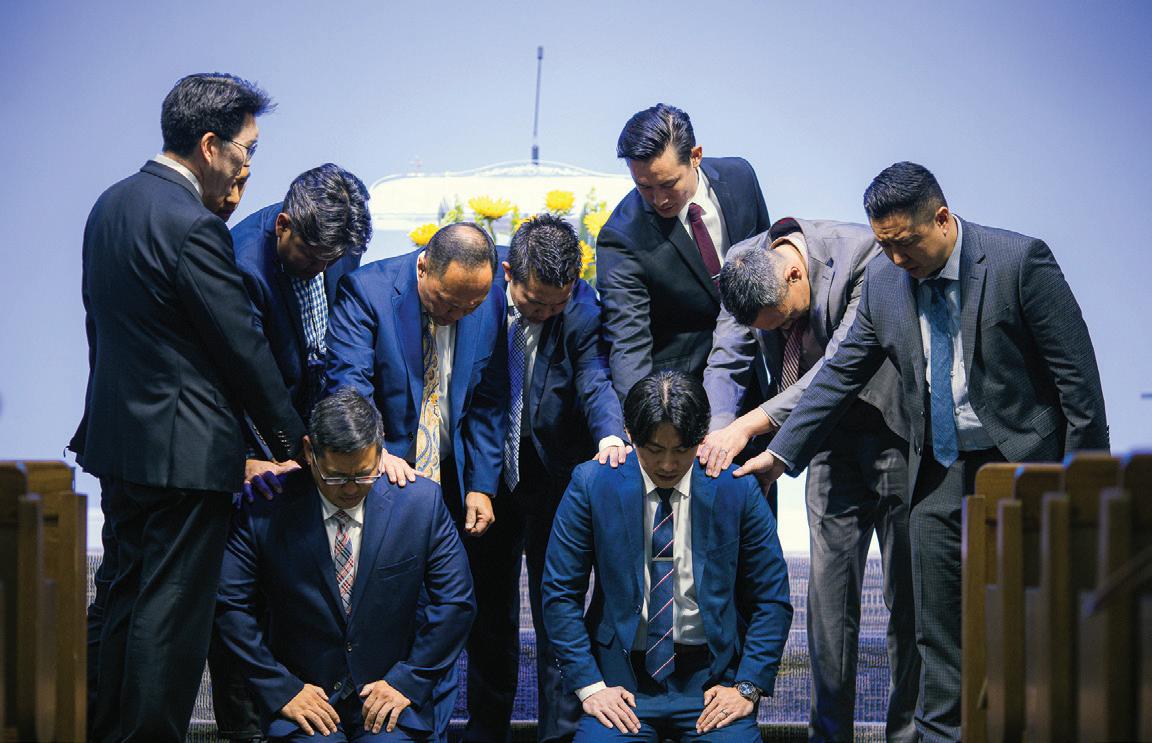
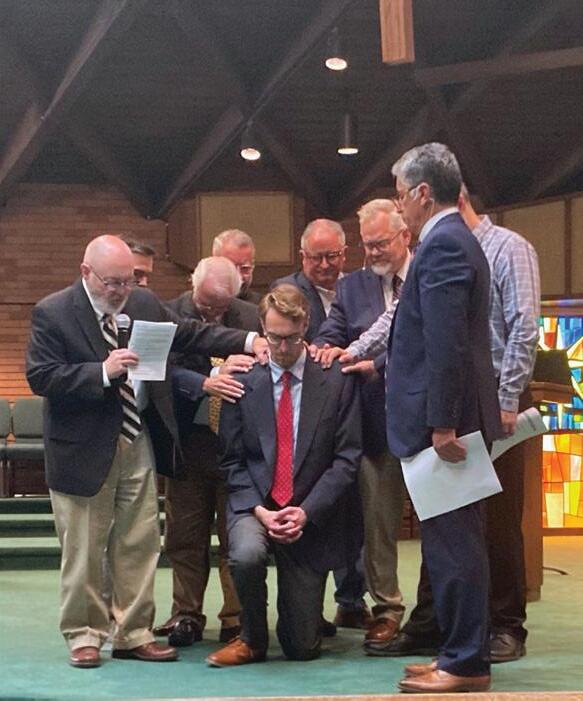
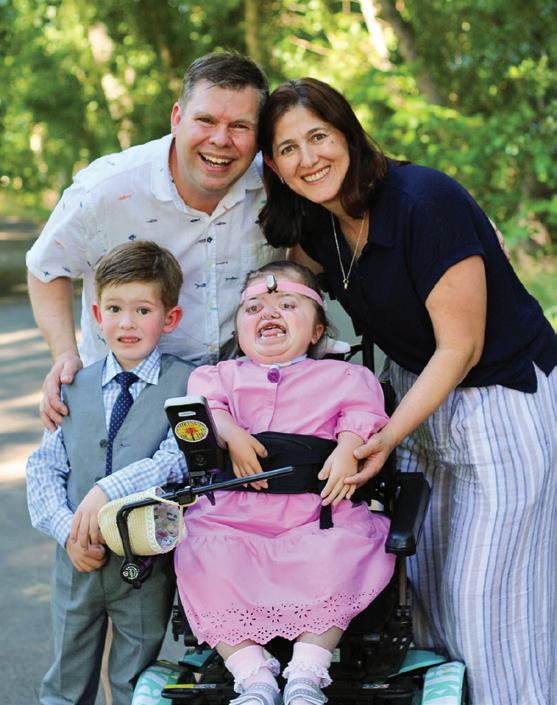
WA in September. Jason was installed on Sept 13, with former classmate and friend James Ogle (MDiv, 2017) giving the charge.
Wesley Viner (MATS) works as the Early Modern Curator at the Museum of the Bible in Washington, D.C. and recently curated an exhibit on C.S. Lewis, literature, and mythology that will be open from March 2025 to February 2026.
Christopher Smith (MDiv-MAHT) and his wife, Rachel, got married on May 30, 2024. They are living in Phoenix, AZ, where Christopher continues to serve as the Associate Pastor of Word and Sacraments at Phoenix URC.
Andrew Chang (MDiv) was ordained and installed on March 2, 2025 as an Assistant Pastor in the Presbyterian Church in America (PCA).

Kyle Grow (MDiv) and his wife, Laura, welcomed their second son, Henry James Grow, in June 2024. He was also ordained in the Presbyterian Church in America (PCA) in April and continues in his role with RUF at San José State University.
Ryan Miller (MDiv) recently became the solo pastor of Taos Mission Church (PCA), engaging in a revitalization effort with this nearly-100-year-old congregation that previously belonged to the Grace Brethren denomination but is now in the PCA.
Terrance Kimm (MDiv) was ordained in the Korean-American Presbyterian Church (KAPC) with the North American Presbytery West (NAPW) on October 27, 2024.
2023
Christopher Kim (MDiv) and his wife, Emily, welcomed their first son, Hesed Sunwoo Kim, into the world on August 24, 2024.
Steve Yoo (MDiv) was ordained in the Korean-American Presbyterian Church (KAPC) with the North American Presbytery West (NAPW) on October 27, 2024.
Josh Feil (MDiv) was ordained on Sunday, November 5, 2023 at Grace United Reformed Church in Portland, OR. The service was officiated by Rev. Jaques Roets of Trinity URC in Visalia, CA along with WSC alums Rev. Chris Coleman (MDiv, 2011) of Peace URC and Rev. Steve Oeverman (MDiv, 2004) of Grace URC.
Arie Van Weelden (MDiv) was ordained and installed as the Assistant Pastor of Youth and Families at Skyview Presbyterian Church (PCA) in Centennial, CO on November 3, 2024. Dr. Jason Barrie preached and Dr. Jason Pickard gave the charge to Arie for the ordination service.

“While the founding of Westminster Seminary California is central to Dr. Strimple’s legacy, most of us who remember him with gratitude knew him primarily as our teacher.”
by DAVID VANDRUNEN
We know that God doesn’t need any one of us to accomplish his purposes. But, humanly speaking, it is difficult to imagine the establishment of Westminster Seminary California without the faithful labors of Robert B. Strimple. Dr. Strimple was the first president of WSC, its long-time professor of systematic theology, and a beloved colleague and teacher to so many in the WSC community. When he died on November 17, 2024, at the age of eighty-nine, those of us who knew him were saddened by the news, yet simultaneously grateful to the Lord for this dedicated servant of Christ.

A brief biography of Dr. Strimple may be helpful for readers unfamiliar with his life. He was born on April 18, 1935, in New Castle, Delaware. He married Alice (Simon) in 1955 and graduated from the University of Delaware the next year. Dr. Strimple was a dispensationalist, Arminian Baptist at this point, but on the recommendation of a pastor he enrolled at Westminster Theological Seminary in nearby Philadelphia. He earned the B.D. and Th.M degrees from Westminster in 1959 and 1965, respectively. Among his professors there, he had special affection for his instructor in systematic theology, John Murray. Although Dr. Strimple became Reformed in most areas soon after beginning his Westminster studies, he retained his Baptist convictions for quite a while and taught at a Baptist Bible college in Toronto from 1961–69.
His convictions about baptism finally did change. Shortly thereafter, Westminster in Philadelphia hired him to teach systematic theology and the Orthodox Presbyterian Church received him as a minister. Dr. Strimple taught in Philadelphia from 1969–79, during which time he also received his Ph.D. from the University of Toronto and served in several administrative positions at the seminary. In 1979, he, Alice, and their four children moved to California with the goal of establishing a Westminster campus on the West coast. While his colleague Robert G. den Dulk focused on administrative and financial matters, Dr. Strimple focused on academic affairs, including recruitment of the original
faculty. Their efforts were so successful that Westminster in California was ready to become an independent institution by 1982.
Dr. Strimple became the first president of WSC, serving in that capacity from 1982–88. After stepping down from this post, he continued teaching full-time until his retirement in 2001. He and Alice remained in Escondido for the first ten years of retirement but moved to the Sacramento area in 2011 when the opportunity opened to move next door to family. Alice died in early 2019. Following Dr. Strimple’s death late last year, WSC hosted a memorial service for him in January 2025, attended by many of his children, grandchildren, great-grandchildren, and in-laws, as well as by numerous former faculty colleagues, students, and friends from local churches.
While the founding of Westminster Seminary California is central to Dr. Strimple’s legacy, most of us who remember him with gratitude knew him primarily as our teacher. That is certainly the case for me. Dr. Strimple regularly taught Anthropology, Christology, Soteriology, and Eschatology. For many years he also taught a section of a New Testament course helping students to understand and evaluate critical scholarship on the Gospels. (Dr. Strimple put this material into his only published book, The Modern Search for the Real Jesus: An Introductory Survey of the Historical Roots of Gospels Criticism, published by P&R in 1995.) He also periodically taught two popular elective courses, one on contemporary Roman Catholic theology and the other on modern atheism.
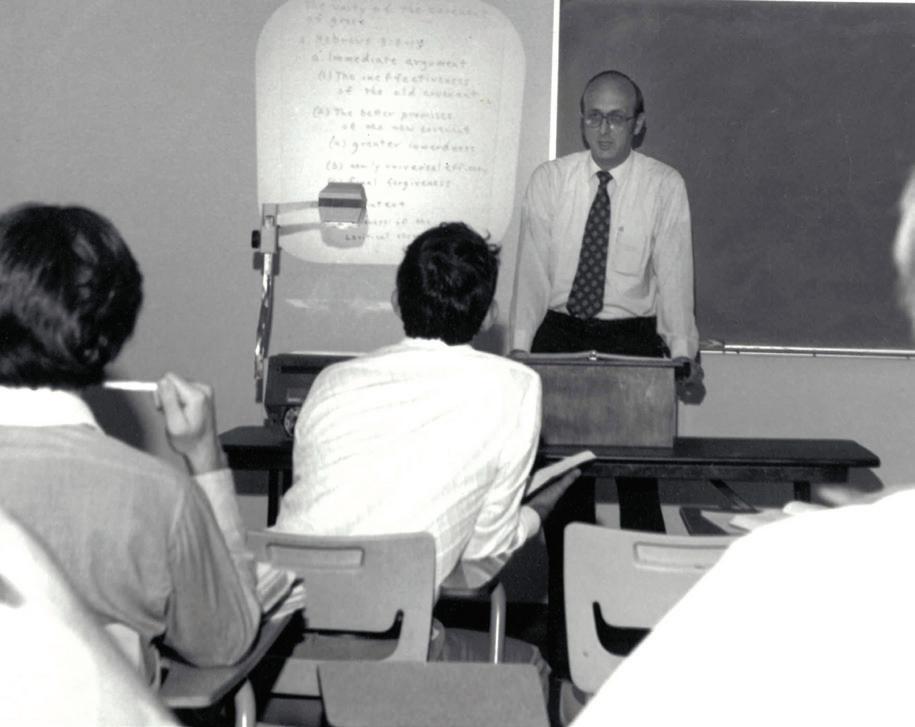
Dr. Strimple’s teaching was shaped by two fundamental convictions: his commitment to historical Reformed theology and his belief that the Reformed system of doctrine is rooted in Scripture. When he taught us systematic theology, therefore, he didn’t just want us to understand what the doctrines were but also why we ought to believe them. He thus spent much of our class time working thoroughly through biblical texts in the original Hebrew and Greek. He himself hadn’t entered seminary with Reformed convictions, and he knew that his own students came from a variety of backgrounds. So he never assumed the truth of Reformed doctrine but always tried to show it. As he had been convinced from Scripture that Reformed doctrine was true, so he labored to build that same confidence in his students.
Dr. Strimple’s interest in students went well beyond the classroom. On campus, Dr. Strimple hosted his weekly prayer group on Wednesday mornings with his student advisees. Off campus, he and Alice loved to host students in their home for their annual Baptism Night, which was devoted to discussion of infant baptism. As a former long-time Baptist himself, Dr. Strimple sympathized with WSC students with Baptist convictions and wished to give them this informal and friendly forum for working through their questions and concerns.
While I was not a member of Dr. Strimple’s prayer group, nor did I require convincing that infant baptism was a biblical doctrine, I was one of the many students over the years who enjoyed camaraderie with him on the
tennis court. Dr. Strimple loved this sport. If my memory is correct, the first thing he ever said to me, when we met shortly after I arrived in Escondido as a WSC student, was: “I hear that you play tennis.” I did play tennis, and over the next three years he and I were regular partners in doubles matches. I believe we were always partners and never opponents on the court. I don’t remember if I ever told him this, but I ordinarily much preferred playing singles to doubles. If Dr. Strimple wanted to play doubles, however, my fellow tennis-playing students and I weren’t going to say no!
Not long after his retirement, an endowed professorship was established at WSC in honor of Robert B. Strimple. It has been a great privilege for me to hold that chair. Every time I see my professional title, I see Dr. Strimple’s name and am reminded of the blessing of being his student and the responsibility of carrying on his legacy. I have always made it my ambition to teach systematic theology much as he did: not only explaining what Reformed doctrines are but also showing students how these doctrines are grounded in the biblical text. Current WSC students remain beneficiaries of Dr. Strimple’s faithful labors in many ways.
David VanDrunen is the Robert B. Strimple Professor of Systematic Theology and Christian Ethics at Westminster Seminary California. Dr. VanDrunen and his wife, Katherine, a WSC alumna, have one son and reside in Escondido.

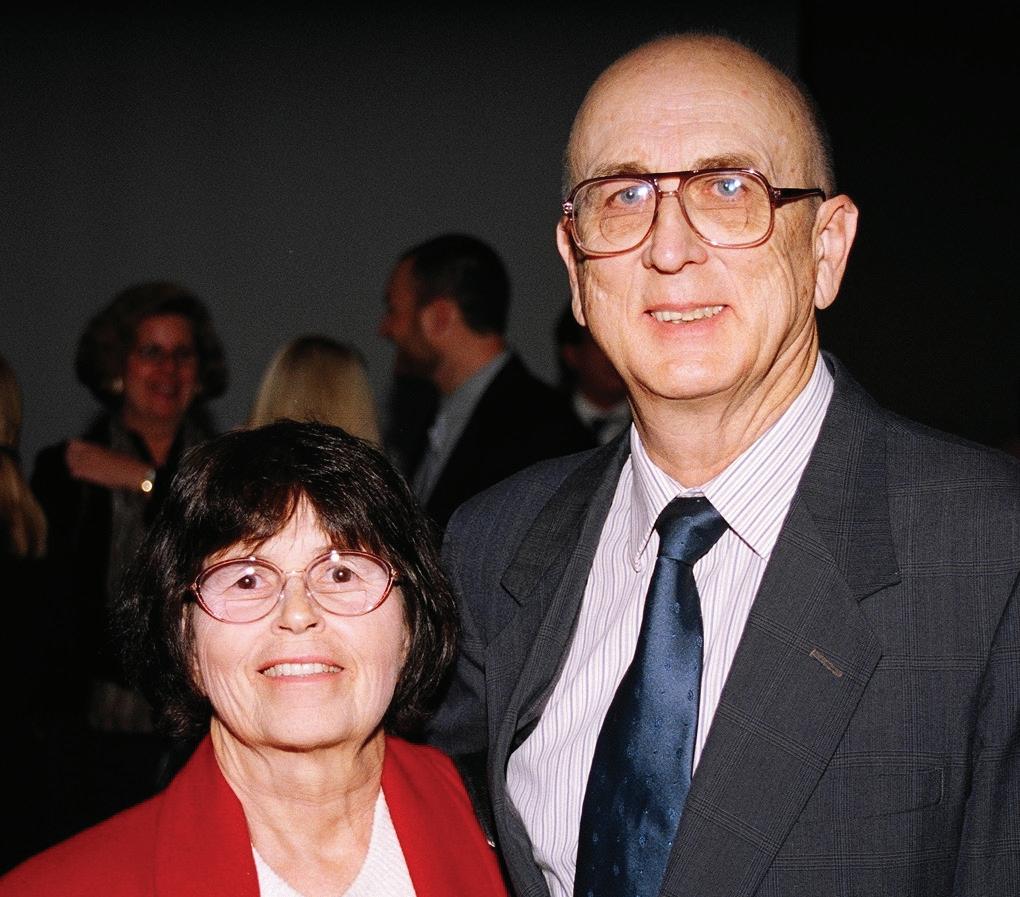

Shaman and Sage, The Roots of "Spiritual but Not Religious" in Antiquity by Michael S. Horton (Eerdmans, 2024)

Perfect Priest for Weary Pilgrams by Dennis E. Johnson (Crossway publishing, 2024)

The Primary Mission of the Church Engaging or Transforming the World? by Bryan D. Estelle (Mentor, 2022)
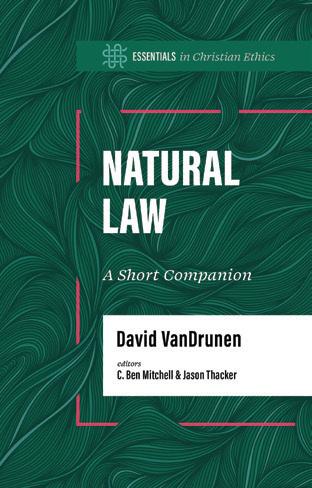
Natural Law A Short Companion by David VanDrunen (B&H Academic, 2023)
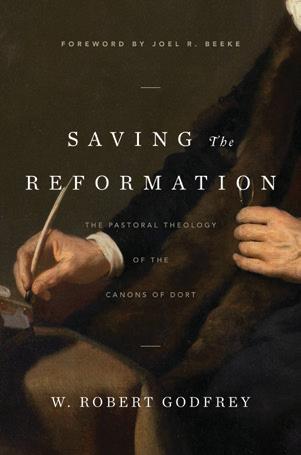
Saving the Reformation
The Pastoral Theology of the Canons of Dort by W. Robert Godfrey (Reformation Trust Publishing, 2019)
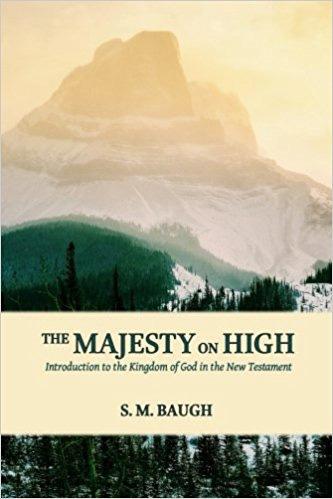
The Majesty on High Introduction to the Kingdom of God in the New Testament by S. M. Baugh (CreateSpace Independent Publishing Platform, 2017)

Learning to Love the Psalms by W. Robert Godfrey (Reformation Trust, 2017)
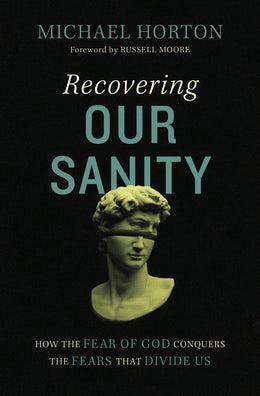
Recovering Our Sanity How the Fear of God Conquers the Fears that Divide Us by Michael Horton (Zondervan, 2022)

Justification
2-Volume Series, New Studies in Dogmatics by Michael S. Horton (Zondervan, 2018)
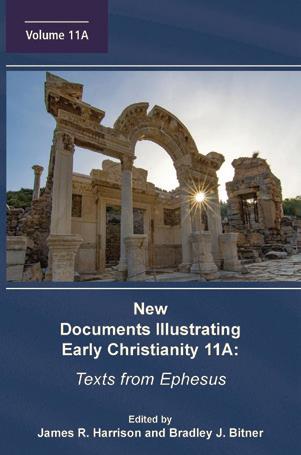
New Documents Illustrating Early Christianity 11A Texts from Ephesus Co-edited by Bradley J. Bitner (Eerdmans Publishing, 2024)
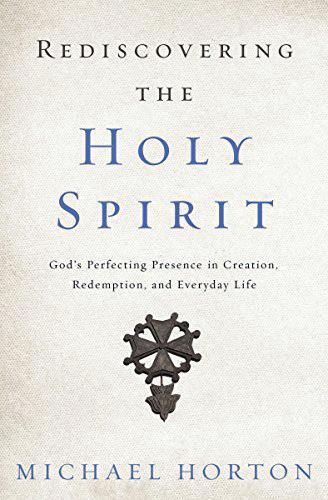
Rediscovering the Holy Spirit
God's Perfecting Presence in Creation, Redemption, and Everyday Life by Michael S. Horton (Zondervan, 2017)

Politics after Christendom Political Theology in a Fractured World by David VanDrunen (Zondervan, 2020)
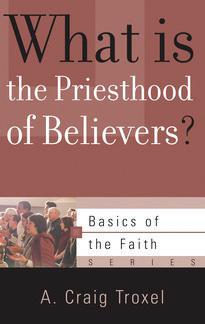
What is the Priesthood of Believers? Basics of Faith Series by A. Craig Troxel (P&R, 2019)
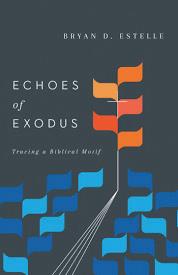
Echoes of Exodus Tracing a Biblical Motif by Bryan D. Estelle (IVP Academic, 2018)

and
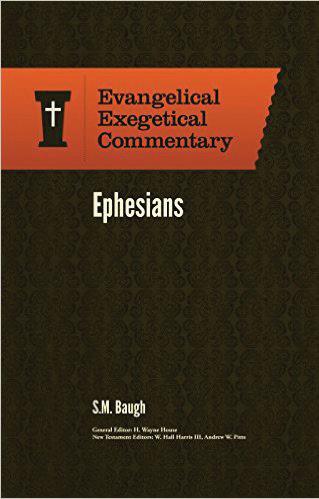
Ephesians Evangelical Exegetical Commentary by S. M. Baugh (Lexham Press, 2016)
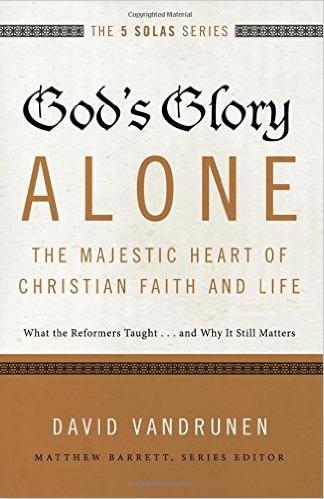
God's Glory Alone
The Majestic Heart of Christian Faith and Life by David VanDrunen (Zondervan, 2015)
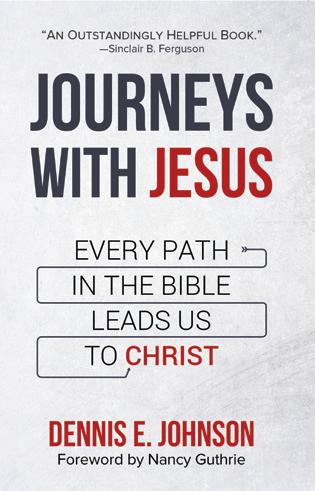
Journeys with Jesus Every Path in the Bible Leads Us to Christ by Dennis E. Johnson (P&R, 2018)
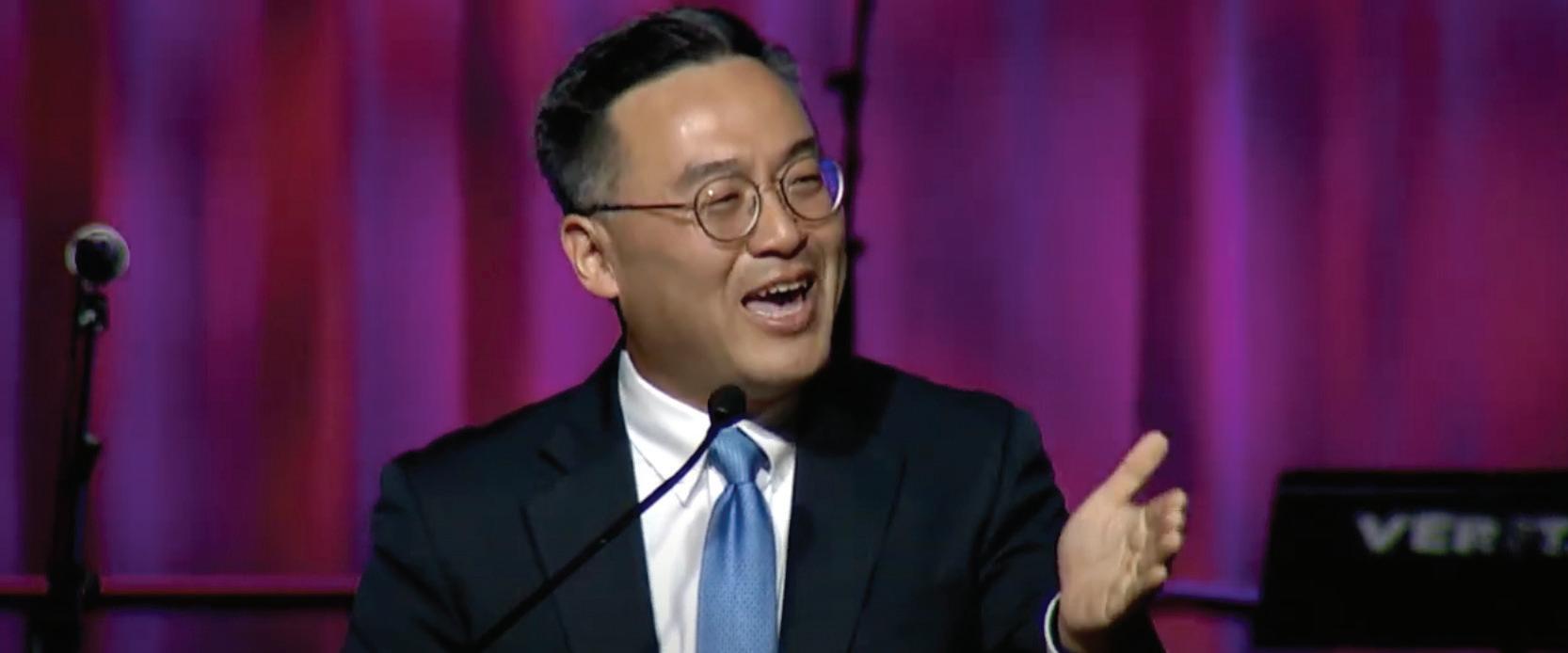
President Joel Kim was privileged to preach the closing worship service of the PCA’s annual General Assembly (GA) this past summer in Richmond, VA. It was a historic moment: this event marked the very first bi-lingual worship service in the PCA’s GA history. In his opening remarks, President Kim said, “I recognize that today we’re only worshiping in two langauges, and in many ways imperfect in our comprehension, but one day we will worship in all the languages, where our comprehension will be perfect. It’s that day that we look forward to, and this is why we gather to worship together in this way tonight.”
For the next thirty minutes, President Kim moved seamlessly between English and Korean as he preached from Psalm 67, in a sermon titled “Blessed to Bless.” Many remarked at how stirred they were by the service, and the message in particular. It was a beautiful display of the unity the church shares in Christ Jesus. “Whatever your last name is, it doesn’t really matter,” Kim reminded the worshipers, “for you belong to the family of Jesus Christ, and you bear his name…. God’s face shines when He sees us, assuring us that we are his and we belong to him.” WSC was honored to be represented at such a meaningful event, which well reflects our aim to be servants of the global church.
R. SCOTT CLARK
“Discovering the Reformed Confession: Theology, Piety, and Practice” Heidelberg Reformation Association (Summer 2025).
BYRAN D. ESTELLE
Review of James M. Hamilton, Jr. and Matthew Damico, “Reading the Psalms as Scripture” Ordained Servant (April 2025).
R. JASON PICKARD
“A Good Conscience,” Presbyterion Vol. 50, no. 2, (Fall 2024). “The Holy and Dreadful Initiation: John Chrysostom’s Baptismal Instructions,” accepted for Publication in Worship (October 2025).
JOSHUA J. VAN EE
“The People of God Motif” Tabletalk (July 2025).
DAVID VANDRUNEN
“Is Love Ever Wrong?" Ligonier website (February 27, 2025). Review of Called to Freedom: “Retrieving Christian Liberty in an Age of License,” by Brad Littlejohn, in Christianity Today online (posted January 16, 2025).
JUNE
1 | Dr. Jason Barrie preaches at New Life PCA (La Jolla, CA)
8 | President Joel E. Kim preaches at Charis Mission Church (Los Angeles, CA)
11 | Dr. David Briones teaches at Westminster Theological Seminary (Glenside, PA)
18-20 | Dr. David VanDrunen teaches a lecture at Seminario Biblico William Care. (Havana, Cuba)
6/22 | Dr. Jason Pickard preaches at North City PCA, Poway, CA
6/29 | Dr. Jason Pickard preaches at North City PCA, Poway, CA
JULY
6 | Dr. Bryan Estelle preaches at Providence PCA, Palm Desert, CA
6 | Dr. Jason Pickard preaches at North City PCA, Poway, CA
10-12 | Dr. Michael S. Horton speaks at Theo Global Middle East & North Africa (Egypt)
13 | Dr. Bryan Estelle preaches at Harvest OPC (San Marcos, CA)
13 | Dr. Bryan Estelle preaches at Harvest OPC, San Marcos, CA
13 | Dr. Jason Pickard preaches at North City PCA, Poway, CA
17-19 | Dr. Michael S. Horton speaks at Theo Global East Africa (Kenya)
20 | Dr. Jason Pickard preaches at North City PCA, Poway, CA
27 | Dr. Jason Pickard preaches at North City PCA, Poway, CA
AUGUST
24 | Dr. David VanDrunen preaches at Harvest OPC (San Marcos, CA)
SEPTEMBER
14 | Dr. Jason Barrie preaches at North City PCA (Poway, CA)
18-20 | President Joel E. Kim speaks at Ligonier Regional Conference (Singapore)
Mrs. Doris Bergsma
Mr. and Mrs. Robert H. Buikema
Mrs. Diann Otten
Dr. Richard W. Bishop III
Mrs. Diane B. Bishop
Rev. Dr. R. Scott Clark
Mr. and Mrs. Richard C. Wolfe
Mr. and Mrs. Henry Doorn II
Mr. and Mrs. Richard A. Haan
Rev. and Mrs. Charles A. Tedrick
Mrs. Gloria B. Duncan
Mr. and Mrs. Jeffrey S. Duncan
Rev. Joel D. Fick
Anonymous
Ms. Marilyn J. Frank
Mr. Burton D. Santee Jr.
Rev. Dr. W. Robert Godfrey
Dr. and Mrs. Richard W. Bishop III
Mrs. Debbie Den Boer
Mr. and Mrs. Ryan Hall
Rev. and Mrs. Todd V. Wagenmaker
Rev. Dr. and Mrs. W. Robert Godfrey
Rev. William C. Godfrey
Mr. and Mrs. Richard A. Haan
Mrs. Karin G. Norlin
Mr. Ben Goedhart
Mrs. Rachel Kats
Ms. Patty Gonzalez
Mr. Shawon Ybarra
Rev. Drew Hoekema
Dr. and Mrs. Jerome W. Bentz
Rev. and Mrs. Joel E. Kim
Mrs. Esther Kong
Rev. John C. Kong
Mr. and Mrs. Clyde and Carol Lems
Mr. and Mrs. Christopher J. Kuperus
Rev. and Mrs. Charles and Michele Tedrick
Dr. and Mrs. Gregory L. Weigler
Mr. Anthony Vander Stelt
Mr. and Mrs. Henk Van Nieuwenhuyzen
Mrs. Mary Vanderbyl
Mrs. Debbie Den Boer
Rev. Dr. David M. VanDrunen
Mr. and Mrs. Richard C. Wolfe
Mr. Age Vellinga
Mr. and Mrs. Mark Kats
Mr. James N. Alexander
Mr. and Mrs. Henry Doorn II
Mr. Tom Bakker
Rev. and Mrs. LeRoy Christoffels
Rev. Dr. Derke P. Bergsma
Mr. and Mrs. Dan W. Van Prooyen
Mr. Elko Brouwer
Mrs. Clara Brouwer
Mr. Adam (Chau-Dung) Chang
Miss Amy Chang
Mrs. Su-Yin Chang
Rev. Dr. Edmond P. Clowney
Rev. and Mrs. Todd V. Wagenmaker
Mr. Martin De Hong
Mr. and Mrs. James W. Onnink
Mrs. Etta de Jong
Mrs. Debbie Den Boer
Mr. and Mrs. Peter de Jong
Mr. and Mrs. Mark Bousema
Mr. and Mrs. Jacobus Brouwer
Mrs. Julia Bushnell
Mr. and Mrs. Lyle B. Faber
Mr. and Mrs. Henry Doorn II
Rev. Dr. and Mrs. W. Robert Godfrey
Mr. and Mrs. Michael A. Kiledjian
Mr. and Mrs. Scott Korthuis
Select Milk Producers
Mrs. Mary Vanderbyl
Mr. Jake De Raadt
Mrs. Cobie Tucker
Mr. Samuel J. Fick
Rev. and Mrs. John Bales
Mr. and Mrs. Henry Doorn II
Mrs. Rachel Kats
Rev. and Mrs. Joel E. Kim
Mrs. Trudy Goedhart
Mr. Ben Goedhart
Mr. Tom Gray
Mr. and Mrs. Herbert Korthuis
Mr. Ivan Groen
Mr. and Mrs. Herbert Korthuis
Mr. Glen Gruett
Mr. and Mrs. James W. Onnink
Dr. Leland Hall Hanowell
Mr. and Mrs. Alex Watson-Wong
Mr. Harlan Harmelink
Mr. and Mrs. James W. Onnink
Gifts Received from May 18, 2024 through April 11, 2025
Mr. John Hoksbergen
Mr. and Mrs. Scott Korthuis
Mrs. Marlene Hoogerhyde
Mr. Garret A. Hoogerhyde
Mr. Stephen A. Hoogerhyde
Judge Alan Cooke Kay
Mr. and Mrs. Henry Doorn II
Miss Lucinda Luengo
Miss Jasmine Youn Ju Kim
Mrs. Lydia W. Wu
Mr. Luke Kim
Rev. Emmanuel J. Kim
Rev. Dr. Meredith G. Kline
Rev. and Mrs. Todd V. Wagenmaker
Miss Elisabeth L. Knot
Rev. and Mrs. John Bales
Mr. and Mrs. Henry Doorn II
Rev. Dr. and Mrs. W. Robert Godfrey
Mrs. Rachel Kats
Rev. and Mrs. Joel E. Kim
Ms. Barb Van Solkema
Mr. Scott A. Kooiman
Mr. and Mrs. Alvin D. Kooiman
Ms. Young Kwak
Mrs. Rachel Kats
Mrs. Milly Likkel
Mr. and Mrs. Herbert Korthuis
Mrs. Mari A. MacVey
Rev. and Mrs. Robert M. Godfrey
Rev. William C. Godfrey
Mr. Ronald W. Prins
Rev. and Mrs. Charles A. Tedrick
Rev. Jay M. Milojevich
Mrs. Lucy E. Milojevich
Mr. Howard Nunninhoven
Mr. and Mrs. Herbert Korthuis
Mrs. Jane E. Prins
Mr. and Mrs. Jacob E. Brouwer
Mr. and Mrs. Brent Cooper
Mr. and Mrs. Lyle B. Faber
Rev. and Mrs. Dale A. Van Dyke
Mr. and Mrs. Arnold Veldkamp
Mrs. Ruth Robinson
Mrs. Mary Vanderbyl
Mr. Arie Roest
Miss Stephania Crowder
Mrs. Debbie Den Boer
Mr. and Mrs. Harrie den Boer
Mr. and Mrs. Henry Doorn II
Mr. and Mrs. Lyle B. Faber
Mr. and Mrs. Mark Kats
Mr. and Mrs. Arlan F. Memmelaar
Mrs. Cobie Tucker
Mr. and Mrs. Andy Van Die
Mrs. Mary Vanderbyl
Miss Barb Van Solkema
Mrs. Susan Singbusch
Mr. Paul S. Singbusch
Rev. Dr. Robert B. Strimple
Rev. and Mrs. John Bales
Dr. and Mrs. Richard W. Bishop III
Mr. and Mrs. Henry Doorn II
Mr. and Mrs. David V. Edling Esq.
Mr. and Mrs. Lyle B. Faber
Dr. Richard B. Gaffin Jr.
Rev. Dr. and Mrs. W. Robert Godfrey
Rev. and Mrs. Adam M. Kaloostian
Mr. and Mrs. Mark Kats
Mr. and Mrs. Michael A. Kiledjian
Rev. and Mrs. Joel E. Kim
Mrs. Elfreda V. Lewis
Mr. and Mrs. Raymond Porter
Rev. and Mrs. Charles A. Tedrick
Miss Barb Van Solkema
HAS SOMEONE TOUCHED YOUR LIFE IN A SPECIAL WAY?
Rev. Dr. and Mrs. Robert B. Strimple
Mrs. Kathryn K. Culver
Rev. Walter Swets
Bloom Sluggett, PC
Mr. Steven Burke
Rev. and Mrs. Joel E. Kim
Mr. and Mrs. Aaron Lindberg
Mr. and Mrs. John R. Sterk
Mr. and Mrs. Scott Gordon Smith
Mr. Gregory J. Tucker
Rev. and Mrs. John Bales
Mr. and Mrs. Klaas De Haan
Mr. and Mrs. John De Raadt
Mr. and Mrs. Henry Doorn II
Mr. and Mrs. Lyle B. Faber
Mr. and Mrs. Joseph M. Guenley
Mr. and Mrs. Mark Kats
Miss Martje Kesting
Miss Nelly Kesting
Mr. and Mrs. Arlan F. Memmelaar
Mrs. Mary Ellen PanKrantz
Mrs. Cobie Tucker
Rev. Dr. and Mrs. Joshua J. Van Ee
Miss Barb Van Solkema
Mrs. Mary Vanderbyl
Dr. James Urish
Rev. and Mrs. John Bales
Mr. and Mrs. Luke M. Urish
Mrs. Patricia A. Urish
Mr. Howard Vande Kieft
Mr. and Mrs. Herbert Korthuis
Mr. Calvin Vanden Hoek
Mr. and Mrs. Scott Korthuis
Mrs. Sjoerdje “Shirley” M. Vander Stelt
Mr. and Mrs. Henk Van Nieuwenhuyzen
Mrs. Betty Verhoeven
Mr. and Mrs. Mark Kats
Miss Barb Van Solkema
Mrs. Mary Vanderbyl
Mrs. Carol Wybenga
Mrs. Mary Vanderbyl
Now you can remember that special someone through a tribute gift. Give "in honor" of someone special or "in memory" of someone who has died. Your gift will also help prepare and equip Westminster Seminary California students to become future ministers and servants of the Church.
HONORARIUM GIFTS provide an opportunity for you to celebrate a special occasion like an anniversary or birthday, wedding or graduation, to recognize an outstanding achievement, or simply to show your appreciation to that special friend, colleague, or loved one.
MEMORIAL GIFTS provide an opportunity to express sympathy to a family who has lost a loved one. The dictionary defines memorial as "something designed to keep rememberance alive."
You are invited to support the education and preparation of students for ministry with a tribute gift today. Your gift will be acknowledged with a card to the honored friend, or to the family of the deceased. Please let us know who you want to honor, or who you want to remember. Both your name and their name will be recorded in the UPDATE Magazine. (The amount of your gift remains confidential.) Call 760-480-8474 ext. 102